#essay bullshit
Explore tagged Tumblr posts
Text
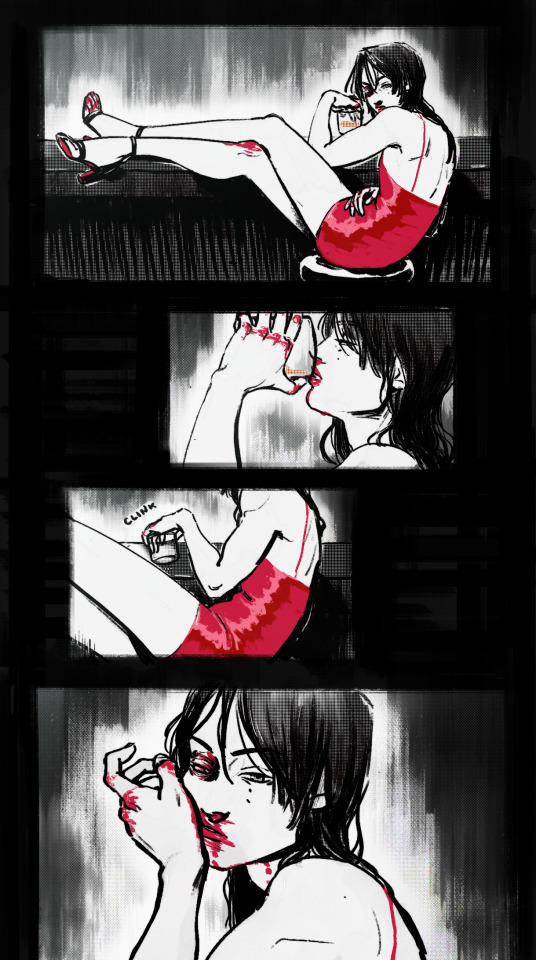
thug beatdown round 2: electric boogaloo
(extras, cw flashing gif:)
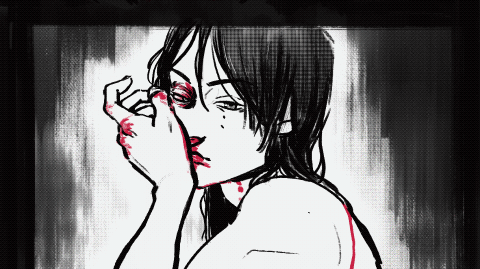
alt:

the fit:
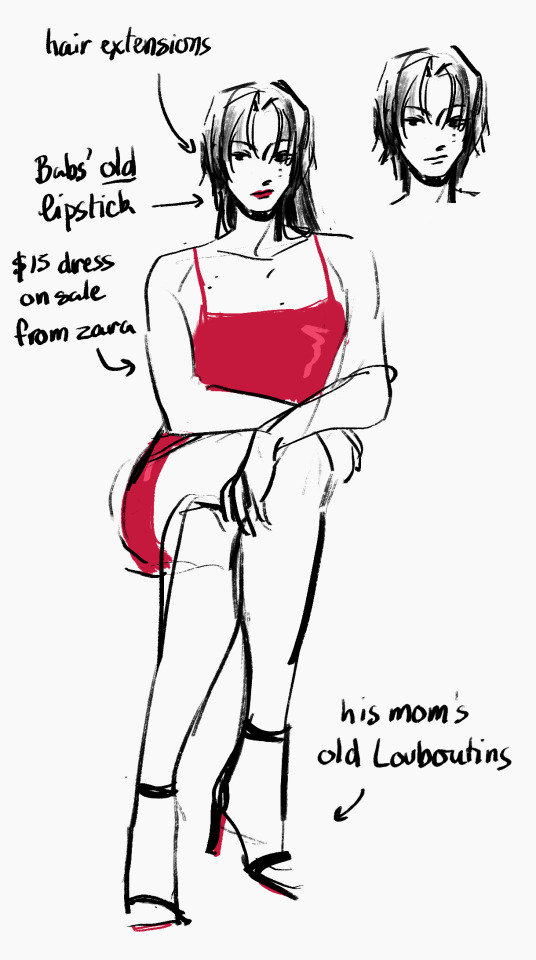
#tim drake#dc#sart#cw flashing#im grateful to the femme tim people for indulging me bc im back on my bullshit#long hair tim!!! LONG HAIR TIM!!!#if dick can have a long hair moment so can tim#further#as a canonical nightwing fan i think tim would at some point try to emulate that (also as a possible successor to the mantle)#(altho the nightwing!damian to batman!cass art i saw once also lives rent free in my mind)#AND if we track the progression of tim's hair from robin to red robin#this is the natural conclusion#in this essay i will—#aside but altho the only time i've seen jack drake drinking in the comics it was beer#we're gonna pretend he was fond of whiskey for the Aesthetic#also traditional upper class white man things#and tim drinks whiskey as a begrudging homage to the father he never really got to share drinks with beyond that one time he got magically#aged up#((i got a new dress and i thought tim would look nice in it))#god i can finally think about other things now
3K notes
·
View notes
Text
Not to be really annoying and go ‘well actually’ to the joke about how silcos a twink who probably didn’t do shit in the mines and that miners all look like vander and are these big buff burly dudes is very much some propaganda in ur brain and not the reality of what conditions are like for miners from impoverished communities. You know they use children in mines bc they’re small right. If you’ve consumed any footage showing messed up mining communities that exists irl, like people who work in cobalt mines in Congo, they’re muscular, but at a glance, they’re not jacked and look pretty average. I think a lot of people are surprised seeing that they tend to be small and lanky for people doing hard manual labor all day, but that comes from not being able to afford enough quality food. You have to eat a ton of calories to get built, and that isn’t something many people who work in mines have.
#in this essay I would like to posit the theory that part of why silco became a crueler revolutionary than vander is#bc he experienced a more impoverished up bringing while vander had access to secure food and shelter#and that experience radicalized him more#I know it’s not real and it doesn’t matter BUT HEAR ME OUT the experience of being in an inherently weaker body created by the material#conditions living in an apartheid state where you’re forced into manual labor is a VERY INTERESTING characterization for your villain so#I love a villain who ends up evils bc really after a certain amount of bullshit they have no choice#which isn’t to say they’re right but serves to show how bad the system is#thank you for coming to my Ted talk#arcane#silco#vander#personal
146 notes
·
View notes
Text
It’s horrible how my design course has killed my enjoyment in creativity because all they want is finished pieces founded in nothing but a spontaneous mark just to hang at some concrete art gallery or to sell to some “join our revolution” comfy business-casual company with a prison cell wellness room. I’m not saying that it’s “not art” —cos that’s a different post altogether— it’s that the ethos behind this particular formula for art education is ruining the way we think about creation.
Design courses (and other art courses I’ve heard?) are no longer teaching artists or designers techniques, drawing skills, art fundamentals and allowing them to find their own voice so much as they are only instructing how to tic boxes alongside pushing corporate and classist motivated style/methodology bias aimed at producing workers, not creatives, not to mention providing Adobe with endless funds for their despicable scam programs. That’s it. My creativity is only a means to money for them, and if they can extract the process of creation from me without the complex creative intimacy involved in it, they know they can churn out products and services faster and it’s concerning some lecturers don’t seem to be aware this is what they’re teaching? Like they’re buying into industry propaganda?
And the whole time it’s sold to you like you can be some trailblazer when the irony is they’re usually either prepping you for cubicle work or for some misguided high horse creative team pumping out design solutions completely divorced from the reality. I’m tired of all the talks about sustainability in a vacuum with no conversation about nuanced designs that factor in broader social and economic perspectives which lack thereof is leading to sustainable products being sold at a price only able to be afforded by wealthier people who are causing said economic and social problems and contributing to the rapid obsoletion of trades and crafts. Lecturers and speakers don’t seem to think that’s any of our concern and should just worry about producing the design for the hypothetical Bluetooth powered organic hairbrush or using the twigs to make the pattern for the £85 fabric square.
Like? Can I please make something that actually resonates with people outside the circle jerk of egotistical creatives and corporations? Something charming and maybe idk something that doesn’t make me want to tear my miserable portfolio in half with my teeth? And they’re like Mm nope sorry it has to be an extreme close up of a mark making abstract leaf you made from a recycled trash bag inspired by a stalled urban space which we will force you to price at £100 during your exhibition 5 people will bother to attend and no you’re not allowed any other style cos this isn’t the Dark Ages :///
I think the worst thing my lecturer ever said was, while looking around the room of our class work reduced down to a series of cubes and splatters and abstract typography, “Wow, I love how you can’t tell what anyone’s [main artist discipline] is!” Like awww conformity at the expense of a person’s individuality to make pieces for airport hallways and rich people’s living rooms wow so cool heehee like girl that’s not good?? Why on Earth are you complimenting us for that? Like I get it, I thought this course would boost skillset as an illustrator (as we were told), turns out the degree is really not for me, fair enough to anyone thinking that, but forcing students to produce modern abstract art because you think it’s the ONLY Logical Pathway for the future of design, judging them intensely for doing a different style, and thinking producing financially inaccessible art + design is the solution to things like climate change and community severance is an objectively bad take.
#needed to get that off my chest it’s been sitting in my drafts and it’s still true#genuinely hate just about everything I’ve produced on this course#like illustration as a course was fine#this one is just depressing#had to almost completely reinvent my art after first year cos this Forced Style threw me off so bad#I am Scared for the future of creativity in academia#wrote a 10000 word essay (for fun) about why the corporate bullshit is contributing to the downfall of art#so needless to say I have my dissertation for my honours already#ok to rb#illustration#design
155 notes
·
View notes
Text
it is actually absurd to me how much they push getting enough sleep as the answer to all your problems in BASICALLY every academic setting and then you talk to the teachers and they've all somehow teamed up to make it so that you have 5 assignments due on the same day. and for some reason its your fault for not time managing better
#the call is coming from INSIDE THE HOUSE!!!#'teens need 8 hours of sleep every night' and then they'd assign some bullshit essay and ignore everyone who was doing any extracurricular#I would be bawling my eyes out so fatigued I couldn’t sit up and still be doing homework. what the fuck was wrong with everyone involved
110 notes
·
View notes
Text
Yes, Odysseus was "Defending what's his" and "reclaiming his kingship, riches, and masculinity" during the killing of the suitors but Leiodes' death shows how it was also still very much personal and about Penelope.
Then Leiodes ran out, grabbed Odysseus’s knee, and begged him—his words had wings: “Odysseus, I implore you at your knee—respect me and have pity. I tell you I’ve never injured a single woman in these halls by saying or doing something reckless. Instead I tried to stop the other suitors when they did those things. They did not listen or restrain their hands from acting badly. So their own wickedness now brings about their wretched fate. Among them I’m a prophet who has done no wrong, and yet I will lie dead, since there’s no future thanks for one’s good deeds.” Shrewd Odysseus glared at him and answered: ��If, in fact, you claim to be a prophet with these men, no doubt here in these halls you’ve often prayed that my goal of a sweet return would stay unrealized, so my dear wife could go back to your own home and bear you children. That’s why you won’t escape a bitter death.” As he said this, Odysseus picked up in his fist a sword that lay nearby—Agelaus had dropped it and left it on the ground when he was killed—with it Odysseus struck Leiodes right across his neck. His head was rolling in the dust as he was speaking.
(Book 22, Johnston)
Leiodes: "Hey, we're good, right? I didn't even do anything with your servants or riches." Odysseus: "I don't care if you didn't do anything else, your crime is that you were trying to court my wife in the first place. You're fucking dead."
Also, he was so angry that he cut off his head in one stroke (Athena was juicing him up but still)
Touch the Wife, you get the Knife.
#I've seen some bullshit about how “Look he was just trying to protect what is his.” when holy fuck. DUMB. ASS.#Yes that's HIS wife but it also goes to show how he wouldn't forgive those even trying to woo her.#A “How dare you try to take her away from me? How dare you bother her without rest for 3 years and causing many tears?”#it's completely understandable Odysseus. There's never anything wrong with killing on Penelope's behalf🥰#btw. basically all translations have him say “Dear Wife” >:)#penelope#odysseus#odyssey#the odyssey#Mad rambles#shot by odysseus#essay#tagamemnon#greek mythology#odypen#odysseus x penelope#penelope of ithaca
228 notes
·
View notes
Text
Wei Wuxian: The Untamed Hero
Wei Wuxian had to be killed even if:
1. He carried his sword
2. He didn't use gui dao
3. He didn't create Yin HuFu
4. The Wen remnants were not in the plot
Then, why? The reason is here, voiced by Jin Zixun of all people:
Wei WuXian, you are too bold! Did the LanlingJin Sect invite you today? And you dare run wild here. Do you really think that you’re invincible, that nobody has the courage to confront you? Do you want to overturn the Heavens?”
Wei WuXian smiled, “You’re comparing yourself to the Heavens? Excuse my language, but your face is a little too thick, isn’t it?”
So, you see, this untamed heart can only meet with tragedy as the world is unrighteous, as those who are in power think their actions cannot be contested (and they often aren't!), and that their words are like the law. How many times have we seen, a convicted powerful person escape the justice system? Far too many. And how many times innocents or victims were framed for crimes? Also too many. People like Wei Wuxian aren't condemned by fate, but rather, being born into a world where the "heavens" are those who are powerful and corrupted, he very well might be destined to live tragically, along with others of his type.
Returning to the matter of this particular scene: on one hand, the Jins throw private banquets, gilded with gold. The major scandals are: Jin Zixun is forcing the Lans to drink alcohol! You see, Lan Xichen can't outrightly refuse, so he is trying to be polite about his rejection. Jin Guangyao is trying to reason and excuse, and distract. The crowd spurs Jin Zixun on, wanting to see the Lans drink for once and fall to their level.
Everyone is in their own fine little world, doing their niceities in their golden halls drinking expensive wine, admiring pretty women, gasping at scandalous behavior, asking for favour, gossiping etc.
And then Wei Wuxian walks in. Uninvited. He simply drinks the wine himself, before demanding these people to spare him their time for real wordly issues, such as deaths, debts, cruelty, the parts that society wishes to hide. A few scenes later, we are shown with much description, just how terrible Qiongqi Path is. That's the Jin's backyard. You see their achievements that are drawn on those big walls? We see the reality of the people making them.
Now, let us come to another incident. Think of the soup incident. I fully expect before Wei Wuxian came into the scene, people were simply gossiping, uninterested in finding out what was going on, why Lady Jiang is crying. Then, Wei Wuxian comes and realizes Jiang Yanli who never really cries... was crying, and firstly decides to beat the shit out of Jin Zixuan. Secondly, he understands the whole truth, beats Jin Zixuan up for humiliating his Shijie, and also makes the other girl face responsibility.
Although his shijie had an easy temper, except for how they cuddled and cried together the day the three of them reunited after Lotus Pier was destroyed, she hadn’t really shed many tears in front of others, much less cry so loudly, so pitifully in front of so many people. Wei WuXian was filled with panic. As he tried to ask her, Jiang YanLi was crying so badly that she couldn’t even speak properly. Then, when he saw Jin ZiXuan standing on the side, astonished, he fumed with anger, wondering to himself why it was the dog of a person again. With a kick, he pounced on Jin ZiXuan. The fight between the two would have alerted the Heavens. All of the cultivators around the base came to break up their fight. Amid the ruckus, he finally understood what was the cause of all this, and became even more angered. He spread his tough talk, saying that one day he’d definitely make Jin ZiXuan die in his hands, he told people to drag out the cultivator woman.
A round of questions later, the truth emerged, and Jin ZiXuan’s entire body was frozen. No matter how much Wei WuXian continued to curse at him, he returned neither words nor fists, his face dark. If not that Jiang YanLi held up her hand a while later, while Jiang Cheng and Jin GuangShan came to pull Wei WuXian away, it was likely that even now Jin ZiXuan wouldn’t be able to attend the hunt of Phoenix Mountain.
See.
The point is, perhaps, people feel Wei Wuxian's actions are unnecessary. But imagine if he wasn't there! The consequences as I predict them will have been:
1. Jiang Cheng who doesn't want to upset a prominent clan would've grumbled and cursed underneath his breath, but eventually just moved away from the ruckus and taken his sister away.
2. Perhaps the truth would never have been found out, unless Jin Zixuan later searched by himself.
3. Thus, Jiang Yanli's reputation would be stained for the years to come.
It's because Wei Wuxian dared that the truth was revealed. I took this small incidents simply to highlight this, without the addition of more factors. In the book, often, it might seem like people are trying to stop him from creating trouble. You might often wish, ugh, this is going to be so bad... The point is Wei Wuxian knows! He's not stupid, he knows of the consequences of his actions.
But he isn't the one creating trouble. It was already created by the likes of those very people who try to stop him from investigating deeper. The trouble in question is that immoral and unrighteous words and actions and decisions have already been made. Society tries to hide them. If you can't see it, it's not there. Yet, even if it is not visible, a crime has its traces and it will bleed into their world sooner or later.
Wei Wuxian forces people to snap out of their comfort zones. He doesn't care for the barriers they set around themselves. Here are some examples to explain what I mean by these barriers:
Who dares hit Jin Zixuan, who's the only heir of LanlingJin, even when he deserves it? Protected by his status, his birth, his clan who dares? Wei Wuxian does.
Who dares to annoy Lan Wangji, the second jade of Lan, who from birth is considered otherwordly, strict, immovable, rigid, untouchable and protected by his extreme cold aura? Wei Wuxian dares.
Who dares to enter cultivation society without even wielding sword, without even cultivating a core? Wei Wuxian!
Since time unknown, treasures have belonged to the powerful sects: The Lan Clan and their library, their many secret techniques. The Jin clan and their treasures, their gold. The Nie Sabres. The Zidian. Yet, a son of a servant somehow ends up possessing the most powerful treasure all by his own! Everyone goes to this popular refinery, some famed blacksmith, or that popular sect to get specially created spiritual weapons, yet Chenqing, one of the most powerful weapons, was forged alone by Wei Wuxian during his 3 months in the Burial Mound!
Since years, the cultivation world has taken to heart rules of Lans, words of the powerful sects, and their leaders! Then, once again, this orphan child comes and bends the world and changes the cultivation society forever! Yiling Laozu said that... Yiling Laozu created... Yiling Laozu's manuscripts...
His words literally become the law.
Think of how 13 years after Wei Wuxian's death when "all was peaceful" despite us knowing very well, just how much shit happened after his death - slaughter of minor clans, deaths of two prominent sect leaders, xue yang etc (because, you know, most of it was purely accidental, kept hush-hush, or the victims were people who weren't important), he comes back to life and in a matter of a couple of months, upends the cultivation society again.
The "problem" is that this guy simply doesn't conform. The problem is that he is better. The problem is that he is not unnecessarily humble about it, despite his origins. He doesn't seem to treat himself as an outlier, but an equal. (That's why I hate insecure Wei Wuxian, like this guy is righteous enough he won't even treat himself badly.) The problem is that all those barriers - social classes, power, the locked doors - they won't keep him away.
Even if he was only the Jiang Da-shixiong with a bright golden core, he will still not be a conformist. To those who aren't used to having their decisions questioned, he is their worst enemy. To whose who are used to talking in circles, spreading rumors, he is asking them. What source do you have? What is the factual evidence behind what you are saying? Why are you saying this now?
Think of how he cross questioned a petty seller selling Yiling Laozu portraits in Qinghe, and how he questioned the gathered cultivation sects in Lotus Pier during Sisi and Bicao's intervention with the same sort of attitude. Surely, there was a major class difference, power difference between the two. Yet, they don't matter to him. What matters is the truth.
So, no matter what, when the people who are in power, start having too much dirty laundry and corpses in their backyards, he will definitely know. For this guy, knowing isn't enough - he will get to the crux of the issue. The problem is, he even has the skill for it. He has the ability. One also can't distract him with offers, promises, gifts, riches, status, women. He doesn't care for any of that. He perhaps might even hate one's victims. Yet he will stand up for them.
Of course, those who are in power, all smile at each other. They understand things sometimes have to be done. People sometimes have to be silenced. "We know better."
Then, Wei Wuxian comes in and says, actually you don't. He comes in with factual accounts, evidences, forces you to face your misdeeds. Says you're all a bunch of hypocritical people. No, perhaps what is worse is that he will make you realize that's what you are! Because he's got to be good at talking, too! He's not going to act on anger or be stunned in fear.
So, now you have someone who's not only digging into your evil deeds, someone who's capable, who's not easy to persuade, but also someone with high emotional intelligence who can play the same role as you do, of being a noble, accepted gentlemen with immaculate manners, of very high literacy and outdo you. Because this guy knows very well how society works, he can comprehend social cues perhaps better than you can. He can use your own polite words and nature against you.
It's precisely because of this he must be killed. Perhaps, in every world, Wei Wuxian will end up being the victim. It's only that in MDZS, these were the particular circumstances, and those were the particular excuses.
My personal take is: sometimes it is good to be a centrist, and hold everyone's better intentions in mind. most of the times it might not be, as there are many conflicting systems in place that allow for true victims who are stuck. most often, the victims are always the ones who DON'T have a voice, who are brushed over as numbers of corpses, rather than people with stories. most often, kindness is shown in little action that are trampled upon by those who hold true power. most often the people who are good, who are heroes die young, or are hated and ridiculed, for speaking up for the victims. it's not right, and never will be.
if someone like wei wuxian or his presence in the book makes you uncomfortable it might be because you hold the "niceities" and the pleasantries to be of more importance than the issues at hand. just because something is too troublesome doesn't mean it is wrong. if everytime he enters the scene you're scared of what he's going to do next, you should know it's not him who is the problem but the prople who aren't doing anything who are. don't be scared of "trouble-makers." he's not erratic or spontaneous. he has considered society's standards and deemed it useless. why is that that the koi tower scene, where he is in his "yiling laozu, loss of control, threatening" moment is followed immediately by him being extremely kind to Wen qing ? it's not that he's losing control. it's that Jin Zixun wouldn't have acted and told him where the people were without him using intimidation tactics. Wei Wuxian is the one forced into bad corners by the powerful people, where he has to show his edges. Don't end up twisted the narratives. if you bite someone for a while, expect to be hit.
#wei wuxian#mo dao zu shi#mdzs#wangxian#my meta#my thoughts#cultivation world bullshit#my essays#When i first watched the untamed Wei Wuxian made me uncomfortable and scared at times#I felt uncomfortable reading the bits of his YLLZ era#and koi tower scene#ive done some introspection and grown
462 notes
·
View notes
Note
agassi/sampras please tell us more! the only thing I know about that rivalry is that sampras was very boring and they they disliked each other. but the way you talk about it sure makes it sound fascinating!
in a nutshell, the appeal is this
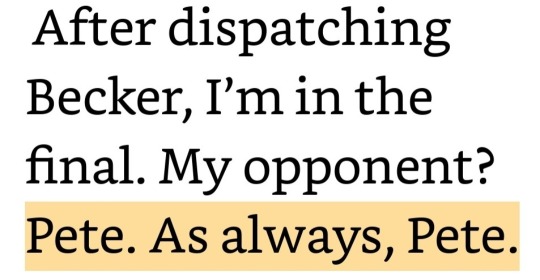


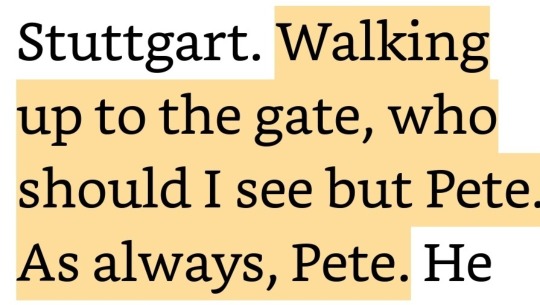
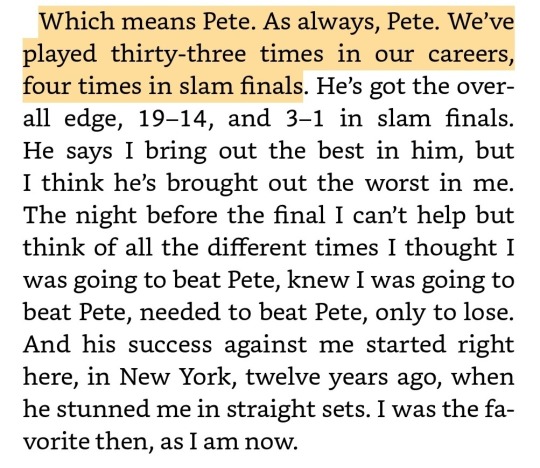
"pete. as always, pete"
imagine your whole career ends up being defined by one guy who you consider the "quintessential opposite" to you, who feels incomprehensible to you, who comes seemingly out of nowhere to beat you again and again and again and again. who is everything you could never force yourself to be. who seems entirely comfortable in a life that torments you. he denies you in what should have been your crowning moment. and then he ends his career by denying you again. inescapable and inevitable
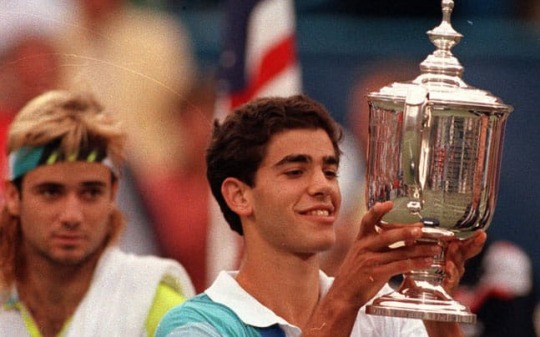

agassi hated tennis with a passion. he hated tennis throughout his career - the sport he was never given a choice but to play, the sport he was forced to excel at. it's not an uncommon story in many respects, an ambitious father who sought greater things for his son... a cocktail of lofty expectations and the pressure applied to achieve them... the predetermined path in life agassi had been moulded to follow. and all of this forms the foundation for his fraught relationship with the sport (x)

as a seven year old, he already dreamt of quitting the sport, of just walking away and playing with his siblings, sitting with his mum - anything but tennis. except even then, it wasn't that simple. as much as he wanted to flee the sport, something about it also forced him to keep coming back for more. as he details in his autobiography:
Doesn't that sound nice? Wouldn't that feel like heaven, Andre? To just quit? To never play tennis again? But I can't. Not only would my father chase me around the house with my racket, but something in my gut, some deep unseen muscle, won't let me. I hate tennis, hate it with all my heart, and still I keep playing, keep hitting all morning, and all afternoon, because I have no choice. No matter how much I want to stop, I don't. I keep begging myself to stop, and I keep playing, and this gap, this contradiction between what I want to do and what I actually do, feels like the core of my life.
his father's favourite training method was to use a ball machine that andre nicknamed 'the dragon' - quite deliberately designed to look frightening, making andre flinch every time it shot balls at him. it spat out balls in unpredictable ways, all to make it impossible to hit it the same every time and forcing agassi to adjust anew for each ball. he was constantly instructed by his father - an iranian erstwhile boxer - to take the ball earlier and earlier, training his reflexes and adaptability through sheer brute force of repetition. what was being forged in the process was a game that was built to react to what the guy on the other side of the net was doing. in tennis, you can win both by attacking and by defending, by acting and reacting. agassi was moulded to do the latter
My father says that when he boxed, he always wanted to take a guy's best punch. He tells me one day on the tennis court: When you know that you just took the other guy's best punch, and you're still standing, and the other guy knows it, you will rip the heart right out of him. In tennis, he says, same rule. Attack the other man's strength. If the man is a server, take away the serve. If he's a power player, overpower him. If he has a big forehand, takes pride in his forehand, go after his forehand until he hates his forehand. My father has a special name for this contrarian strategy. He calls it putting a blister on the other guy's brain. With this strategy, this brutal philosophy, he stamps me for life. He turns me into a boxer with a tennis racket. More, since most tennis players pride themselves on their serve, my father turns me into a counterpuncher - a returner.
the biggest and most important weapon in tennis is the serve, and sampras had one of the best serves this sport has ever seen. like agassi a child of immigrants, his personal history is largely free of the angst of agassi's tale - though it should hardly be surprising that he had a strict father of his own to push him along his path. the type who was perfectly willing to make his disappointment felt whenever pete didn't live up to his exacting standards, even if pete was generally a pretty obedient kid, attentive of what his father demanded of him. take this anecdote about young pete speaking to a reporter after a big win at juniors level (from sampras' autobiography):
The next day, on the very same court, I lost something like 6-1, 6-0 to Mal Washington. I mean, he really schooled me. So after that match, the same reporter went over to Mal and got an interview from him. My dad pulled me aside and said, "You see that guy who talked to you yesterday? Now he's talking to Mal, because it's all about how good you are every day, not one day."
tennis parents. gotta love them
anyhow, sampras says he learned his lesson - and he also learnt to live by his father's straight-talking, honest ways. blunt and to the point. sampras was generally a considerably more straightforward character than agassi, "boring" as some might put it. he didn't hate the sport - he was good at it and he wanted to be better, always working tirelessly towards that goal like the perfect professional he was. to that end, he had to make some major adjustments to his game as a teenager, making the radical switch from a two handed to a one handed backhand and uprooting his whole style of play to make him the ultimate attacking player
But there were uphills and downhills, and my toughest challenge was changing my mindset from grinder to attacker. I had to learn to start thinking differently, and more. A grinder can lay back, waiting for a mistake, or tempt you to end points too quickly. An attacker has to think a little more: Flat serve or kicker? Charge the net, or set up a groundstroke winner? Is my opponent reading my serving pattern or shot selection? As a serve-and-volleyer, you attack; as a grinder you counterattack. The basic difference between attacking and defending is that the former requires a plan of attack and the latter calls for reaction and good defence. In both cases, execution is paramount.
'serve and volleying' as a playstyle has basically died out in the modern game (it still exists as an occasional tactic), but back then it was extremely common. the principle is straightforward enough: you hit a big serve and then you follow the ball, so that when your opponent returns it, you can hit the next ball out of the air (the volley). it's the purest attacking playstyle imaginable. it simplifies every service point, focuses everything in on the execution of just a few strokes. ideally, most rallies won't last longer than three shots - serve, return, first volley, rinse and repeat. short, fast, and sweet. when it is executed well, it is as lethal as it is efficient
agassi and sampras were part of a high profile quartet of american players to turn pro in the late eighties. the first of these to win a slam was sampras' childhood archrival michael chang, still the youngest man ever to win a slam at only seventeen years of age. the fourth member of this quartet was jim courier - who had trained in the same academy as agassi as a teenager and had generally felt neglected when compared to the star pupil. young agassi was a prodigious talent with unique style and flamboyance that served to grab the public's attention; he was the one who hogged the most headlines and carried the loftiest expectations on his shoulders, anointed the new flag=bearer of american tennis... and he was soon coming under increased pressure to finally crack on and win one of these slams. an immensely promising junior, the next big thing in american tennis, the guy who was supposed to rewrite the history books... by 1990, at just twenty years of age, the public was already threatening to lose patience with him
I go to the 1989 French Open and in the third round I face Courier, my schoolmate from the Bollettieri Academy. I'm the chalk, the heavy favorite, but Courier scores the upset, then rubs my nose in it. He pumps his fist, glares at me and Nick. Moreover, in the locker room, he makes sure everyone sees him facing up his running shoes and going for a jog. Message: Beating Andre just didn't provide enough cardio. Later, when Chang wins the tournament, and thanks Jesus Christ for making the ball go over the net, I feel sickened. How could Chang, of all people, have won a slam before me? Again, I skip Wimbledon. I hear another chorus of jeers from the media. Agassi doesn't win the slams he enters, and then he skips the slams that matter most. But it feels like a drop in the ocean. I'm becoming desensitized.
in 1990, agassi competed in two slam finals. the first was on the clay of roland garros, the fetching pink of his kit (see below) drawing plenty of headlines as he (very satisfyingly) beat both courier and chang on the way to the championship match. then, in the final, he lost in straight sets - in large part because he was terrified his precious hairpiece was going to fall off. which is definitely a story that deserves more space than it is being provided here... look, go read his autobiography, it's worth it
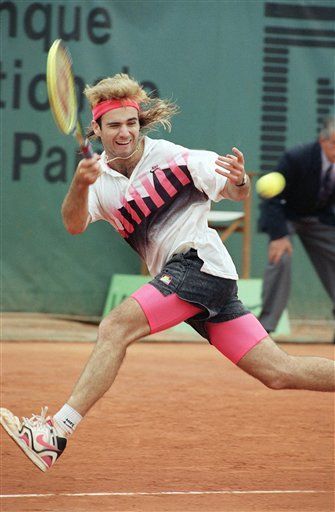
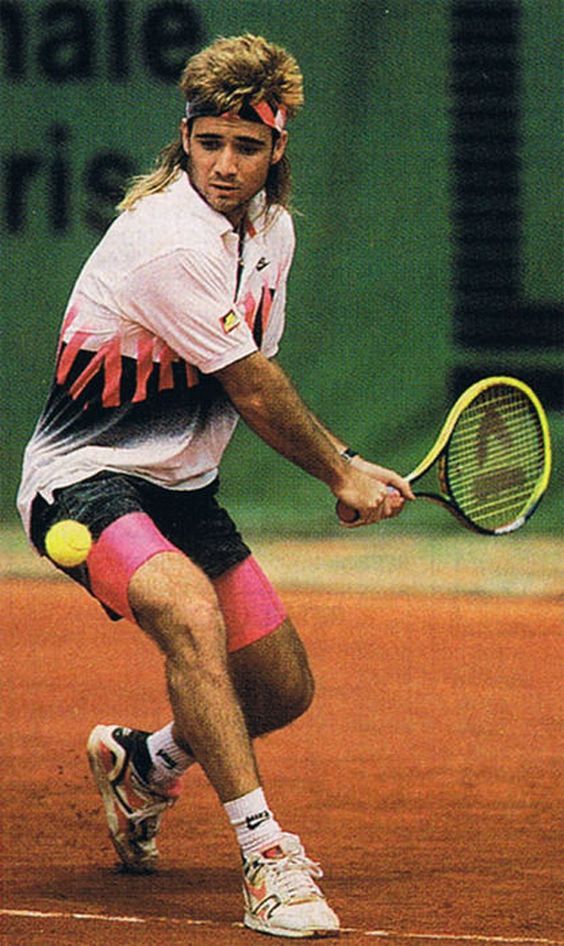
the next slam final was on home soil, conducted in the frenetic cauldron of the arthur ashe stadium. this was agassi's coming of age tournament at the slam he most wanted to win. he had scorned wimbledon, dismissive of the stuffy atmosphere and the grass courts and the strict dress code. he simply could not be bothered to travel to australia in order to compete at the australian open. roland garros was perfectly fine - but really, it was the us open in all its boisterous exuberance he wanted to conquer more than anything. and the us open crowd was ready to watch their new great hope win. agassi beat boris becker in four to advance to the final, eagerly awaiting his opponent - either the decorated john mcenroe, or a nineteen year old kid who had previously never gotten past the fourth round of a slam. sampras and agassi had already played when they were kids, with agassi in his autobiography remembering a match back when sampras was nine years old and agassi was ten. they had faced each other for the first time as professionals in 1989 on the italian clay... agassi had previously dismissed sampras while watching him practise, critical with his team of sampras' ruined backhand in particular. in rome, agassi beat sampras easily despite the improvements sampras had made
I beat him, 6-2, 6-1, and as I walk off the court I think to myself that he's got a long and painful slog ahead. I feel bad for the guy. He seems like a good soul. But I don't expect to see him again on the tour, ever.
the following year, in 1990, they play again and sampras wins in three - fittingly on the way to his maiden title. later that season, they meet for the first time in a slam final. now, look, the problem with narrating this rivalry is that the perfect narration already exists. it is agassi's autobiography 'open' and is available at all good bookstores etc etc. here is the most relevant excerpt:
It doesn’t seem possible, but the kid I thought I’d never see again has reconstituted his game. And he’s giving McEnroe the fight of his life. Then I realize he’s not giving McEnroe a fight—McEnroe is giving him a fight, and losing. My opponent tomorrow, incredibly, will be Pete. The camera moves close on Pete’s face, and I see that he has nothing left. Also, the commentators say his heavily taped feet are covered with blisters. Gil makes me drink Gil Water until I’m ready to throw up, and then I go to bed with a smile, thinking about all the fun I’m going to have, running Pete’s ass off. I’ll have him sprinting from side to side, left to right, from San Francisco to Bradenton, until those blisters bleed. I think of my father’s old maxim: Put a blister on his brain. Calm, fit, cocksure, I sleep like a pile of Gil’s dumbbells. In the morning I feel ready to play a ten-setter. I have no hairpiece issues—because I’m not wearing my hairpiece. I’m using a new, low-maintenance camouflaging system that involves a thicker headband and brightly colored highlights. There’s simply no way I can lose to Pete, that hapless kid I watched with sympathy last year, that poor klutz who couldn’t keep the ball in the court. Then a different Pete shows up. A Pete who doesn’t ever miss. We’re playing long points, demanding points, and he’s flawless. He’s reaching everything, hitting everything, bounding back and forth like a gazelle. He’s serving bombs, flying to the net, bringing his game right to me. He’s laying wood to my serve. I’m helpless. I’m angry. I’m telling myself: This is not happening. Yes, this is happening. No, this cannot be happening. Then, instead of thinking how I can win, I begin to think of how I can avoid losing. It’s the same mistake I made against Gómez, with the same result. When it’s all over I tell reporters that Pete gave me a good old-fashioned New York street mugging. An imperfect metaphor. Yes, I was robbed. Yes, something that belonged to me was taken away. But I can’t fill out a police report, and there is no hope of justice, and everyone will blame the victim.
what I can contribute are some high quality screenshots of agassi's mid-match beleaguered frustration at perfect pete who was currently in the process of mugging him
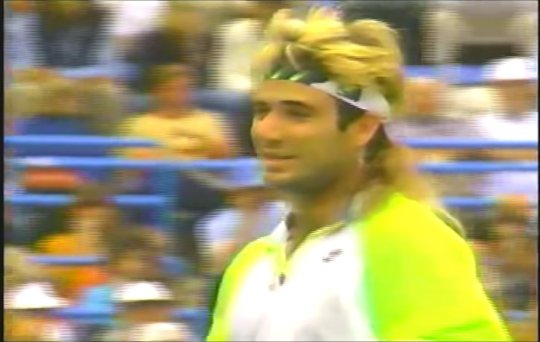
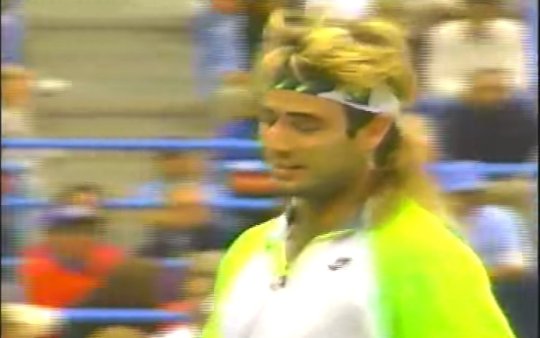
and here's agassi pulling sampras in at the net after losing in straight sets, 4-6 3-6 2-6
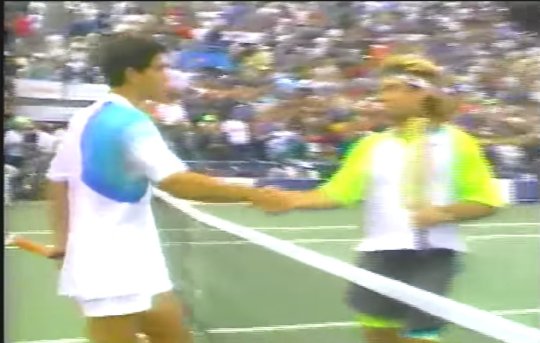
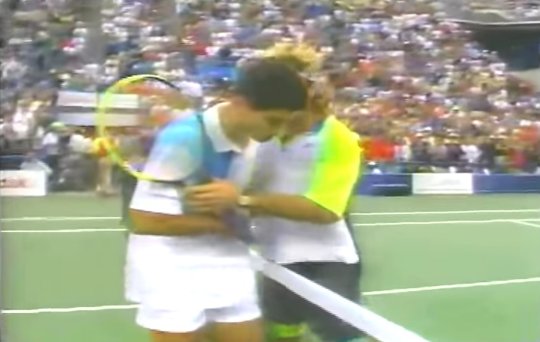
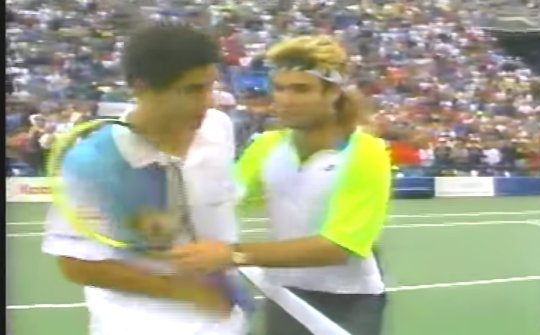
Hours later my eyes fly open. I'm in bed at the hotel. It was all a dream. For a splendid half second I believe I must have fallen asleep on that breezy hill where Philly and Nick were laughing about Pete's ruined dream. I dreamed that Pete, of all people, was beating me in the final of a slam. But no. It's real. It happened. I watch the room slowly grow lighter, and my mind and spirit grow palpably darker.
it is a brutal loss for agassi. not only has he once again been denied a slam - but it's happened at the hands of a direct peer, a compatriot, a nineteen year old american who has flown relatively under the radar until now but has snatched away from agassi the title that he felt should have rightfully been his. agassi had already become a frequent target for media storms, most memorably with the infamous 'image is everything' canon marketing campaign that had been widely used to mock him - but now, here was the proof anyone needed that this overhyped, cocky showman wasn't anywhere near as good as he'd been cracked up to be. it didn't help that sampras provided such an obvious contrast to agassi... quiet, more reserved, outwardly humble, less showy and less prone to drama and with a far more clean cut image... really had way more of a sweater boy aesthetic going for him y'know
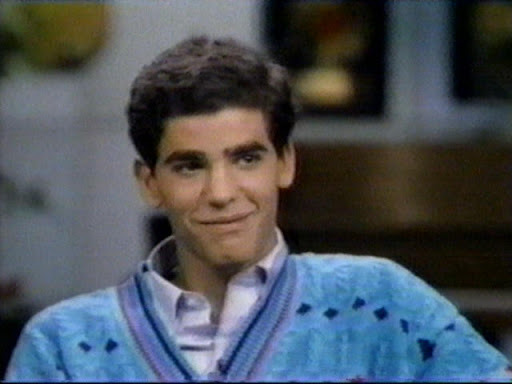
tennis is a fundamentally conservative sport that is ill at ease with its own conservatism. the soul of the tennis fan secretly longs for a little glamour, a little excitement, something with a little more flair and thrill than the purist should strictly allow. when confronted with excessive emotion, when exposed to the true messiness of competitive fervour, the response of the fan is conflicted. on the one hand, the spectacle is exhilarating, to be celebrated, stimulating in the controversy it causes. but on the other, transgression is something to be repudiated and to be punished. the tennis fan averts their eyes but cannot look away, eager to capture every detail of how the gentleman's sport is being defiled by the newest freak show. the tennis fan begs for players to feel every emotion deeply - then jeers at them for losing their heads. the tennis fan hates sampras for being dull and lacklustre, for winning points as quickly as he can and refusing to provide much in the way of a show. the tennis fan hates agassi for being a loose cannon, for feeling so much and never quite living up to his potential as a result, for being so loud and vocal and obvious in his imperfections. sampras is a robot. agassi is a clown. sampras lacks personality. agassi lacks conviction. it is distasteful how hard agassi finds the life of a tennis player, but sampras finds it far too easy entirely. the fan loves to hate agassi, but sometimes they forget to think about sampras at all
the rivalry and their two respective careers develop from there. agassi has to go through a third slam final defeat, a horrendously painful five set affair against his old enemy jim courier at roland garros that leaves many doubting he will ever get over the line. but at last he secures his first major in 1992 at wimbledon of all places - the slam he had once upon a time had so little respect for he did not even bother to attend. sampras in all his precocity struggled for a while to adjust to a slam champion's life and took until 1993 to add to his own collection... beating agassi once again on the way to snatching agassi's wimbledon crown off him. there's a lot of stuff in those few years I'm going to skim over for the sake of brevity... like the final the two of them played where sampras was really ill right before the start and agassi agreed to a delay, only to be beaten by a revitalised sampras... that 1993 wimbledon match and sampras' nasty habit of catching agassi by surprise... or all their davis cup exploits (the main nation-based event in men's tennis, basically think like the world cup) where they both faltered and won as a team

let's pick up the narrative again in 1995. agassi had won his second slam at the back end of 1994, finally taking the us open title he so craved. and so, at the start of 1995, he made the enlightened choice of going - hey, you know how there's four slams on the tennis calendar? how about showing up to all four of them! yeah, not kidding, 1995 was the very first time agassi made the trip down to australia for the first slam of the year. which is a teensy bit unfortunate, because it turned out he was actually brilliant at that tournament. in 1995, he was the second seed at the tournament (sampras, of course, being the first) and scythed his way through the draw, making the final without dropping a set. sampras, by contrast, was progressing nowhere near as smoothly. his long time coach, tim gullikson, had been suffering from seizures for a few months and was flown home for tests after going through another seizure while practising with sampras. in his next match, sampras faced courier, fighting back from two sets to love down to level the match. then, in the fifth set, he broke down in tears during the changeover and struggled to contain his sobs while playing the next few games. courier asked whether sampras wanted to come back to finish the match the next day... something sampras interpreted as a sarcastic comment, which pissed him off enough to get him to regroup and focus once again. he went on to win the match. this is another part of the story that will not get the attention it deserves in this post, and there's a lot more to be said about how sampras describes the incident in his autobiography - his frustration with the narrative that he had finally shown how he was 'human' after all. it is this incident that is still what the tournament is perhaps remembered the most for. gullikson passed away the following year
and so sampras faced agassi in their second meeting in a slam final, fourth meeting in slams overall. agassi had gone through a major style rebrand since the last time they'd played, at last forgoing the hair he was so closely associated with (aka ditching the finicky hairpiece that had been distracting him in slam finals) and embracing the bald pirate aesthetic
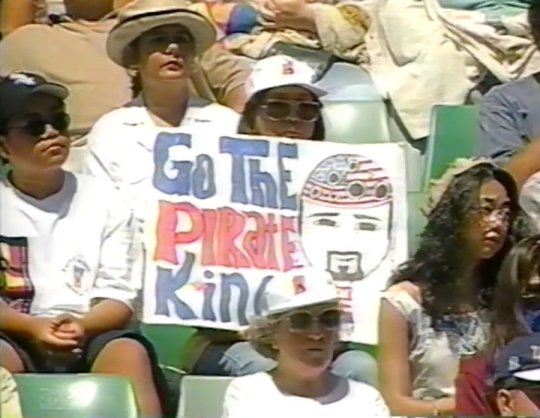
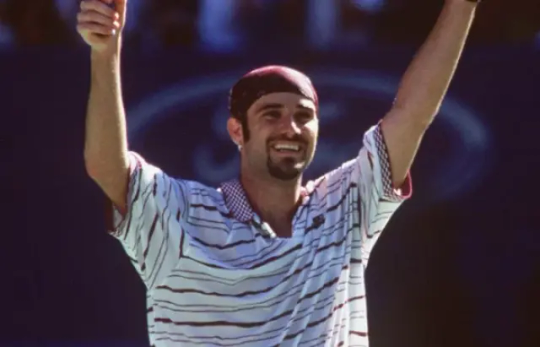
perhaps a little more importantly, agassi won the match in four sets, claiming his first australian open title at the very first time of asking. I was going to check if I had any particularly insightful notes about the match - but mostly it's stuff like pointing out that the first set ends on an agassi double fault and the second one opens on a sampras double fault (#mygoats), plus enlightened commentary like this

we'll leave the sophisticated match analysis for another day
and here they are in their respective autobiographies about the conclusion of that tournament
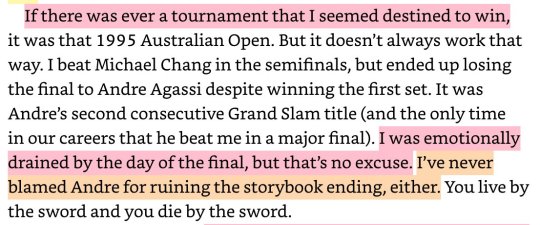
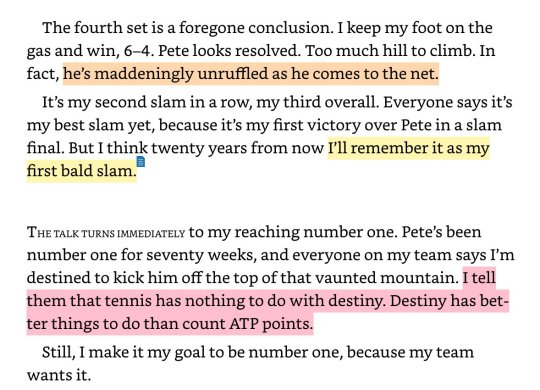
"a tournament that I seemed destined to win" // "tennis has nothing to do with destiny"
and from there, it was game on. 1995 was basically the year of their rivalry. after the australian open final, they immediately faced off in both indian wells and miami. as sampras describes it, the increased exposure meant the general sports fans had more and more opinions about the pair of them and their rivalry: "we presented enough of a contrast to make people feel passionate about why they preferred one of us to the other". that season also featured an increased marketing push from nike to make this rivalry A Thing while the pair of them spent the year hashing out the number one ranking. we're talking joint marketing campaigns, interviews, all that shebang... once again, I won't be able to do this time period justice here - but at least in passing you do have to mention nike's famous "guerrilla tennis" ad campaign (see here), where they would play on makeshift courts set up in city streets. as sampras put it:
The campaign was brilliant, and it was an enormous success. And it worked because, instead of "Pete or Andre?" or "Pete vs. Andre" driving Nike's promotions, it became Pete and Andre. There was a welcome, counterintuitive feel-good message conveyed in them. The commercials helped further interest in the game and our rivalry. It also caught the true nature of our relationship. We had plenty of differences, but we were friends.
an important thing to remember, right - sampras was generally keen for the agassi rivalry to flourish because it helped him too. it helped combat the perception that he was boring, that he had a dull game too reliant on his serve (especially on the speedy grass of wimbledon, where he increasingly excelled at), that he had too little of a personality to capture the imagination of the masses. it also helped his relationship with nike, who he often didn't see eye-to-eye with - the agassi rivalry brought those guys on side because of how marketable they were as a unit. in his autobiography, sampras points out that players are only ever seen as good as the quality of their opposition, and agassi always had the potential to be sampras' ideal career rivalry. agassi becoming a more consistent, prominent rival was good news for the both of them... but, well, often it was sampras who got the most out of the whole thing
given we're in 1995, at this point I do need to throw in a top three anecdote from agassi's autobiography that just like... nails who both of them are As Guys and what the dynamic between them looked like


if my archrival said in his autobiography that I sounded more robotic than his parrot, I would do something that would get me on national news (more on that later)
so then... it looks like they'll meet in another slam final that year, at wimbledon. as agassi so nicely puts it,
In the semis I face Becker. I've beaten him the last eight times we've played. Pete has already moved on to the final and he's awaiting the winner of Agassi-Becker, which is to say he's awaiting me, because every slam final is beginning to feel like a standing date between me and Pete.
cute
of course agassi goes on to lose that match, after which becker makes some disparaging comments about agassi - prompting some fun drama that does also deserve more space than it will be provided here. the long and the short of it is that agassi vows vengeance and sets of on his "summer of revenge", going on a massive tear on the american hard courts. he defeats sampras in the final of canada, is unbeaten all summer going into the us open... at the us open, his hot streak continues - and he gets the great satisfaction of beating becker in the semis. revenge completed. 26 wins in a row
but of course, there's one more match to go. and it's the one that matters most of them all. it's also the one that agassi loses. "no matter how much you win, if you're not the last one to win, you're a loser. and in the end I always lose, because there is always pete. as always, pete." it's the brutality of tennis, the relentless inescapable cycle that so tormented agassi... there's always another tournament immediately on the horizon - and most weeks, defeat is waiting for you at the end of it. a lot of weeks, it was sampras who was waiting for agassi. after the glorious high of that entire summer, agassi had been brought back down to earth. he would struggle for years to recover
I've always had trouble shaking off hard losses, but this loss to Pete is different. This is the ultimate loss, the ueber-loss, the alpha-omega loss that eclipses all others. Previous losses to Pete, the loss to Courier, the loss to Gómez - they were flesh wounds compared to this, which feels like a spear through the heart. Every day this loss feels new. Every day I tell myself to stop thinking about it, and every day I can't. The only respite is fantasizing about retirement.
this began agassi's unravelling, the downward spiral that would consume the next two years of his life. eventually, he dropped out of the top hundred entirely. it was in 1997 that he infamously failed a drug test and managed to escape punishment plus cover the whole thing up (he had indeed taken crystal meth). he barely played tennis at all during that year. it would take him until 1998 to regroup and recommit to tennis, to decide that he wanted this enough to fight for it anew
in the mean time, let's bring in two encounters between sampras and agassi in fittingly liminal locations - one in a plane and the other in an airport. these brief moments of letting their guards down - of talking to each other as people - that are described in their respective autobiographies... both reckoning with the vast differences between the pair of them. first, there's late 1995, where agassi was already evidently struggling with the mental impact of the us open loss - as well as with the injuries that ruled him out of playing the davis cup. in a gesture sampras appreciated, agassi turned up anyway to support his team. here is sampras's account of a flight on agassi's private jet to los angeles:
I sensed on that flight that Andre was struggling. He quizzed me very closely on how I lived my life, and seemed dumbfounded to learn that I had moved to Tampa solely for my tennis game. I told him that I missed my family, and Southern California, but considered it a necessary trade-off. He admitted that he wouldn’t give up living in Vegas, or his lifestyle, in order to be the best player in the world. The contrast was clear and striking, although Andre made that point at a time when he was feeling a little disillusioned by the game. Through all of that, though, I always believed something that others, particularly people who didn’t know Andre very well, doubted. I always thought that Andre was a sincere guy. When we spent time together out of the limelight, he was always honest and frank—and I respected him for that. Davis Cup was always a good time when Andre was around. He was, at times, downright exuberant. He frequently let his guard down in Cup practices, screaming and yelling about any little thing, just for the fun of it. He seemed to get a kick out of stirring things up, creating drama, taking little things and making a big deal out of them. He was emotional, and he liked to whip up others’ emotions. At other times, we sat around in the locker room and talked about this or that, mostly about sports, and it was very comfortable. Andre was inquisitive. He liked to compare notes on players and he was eager to see how others perceived the same things he was thinking about. Andre had a great grasp of strategy; it was a great asset, given the type of game he played.
and then, two whole years later in 1997 - here's agassi about a meeting they had in the airport:
Walking up to the gate, who should I see but Pete. As always, Pete. He looks as if he's done nothing for the last month but practise, and when he wasn't practising, he was lying on a cot in a bare cell, thinking about beating me. He's rested, focused, wholly undistracted. I've always thought the differences between Pete and me were overblown by sportswriters. It seemed too convenient, too important for fans, and Nike, and the game, that Pete and I be polar opposites, the Yankees and Red Sox of tennis. The game's best server versus its best returner. The diffident Californian versus the brash Las Vegan. It all seemed like horseshit. Or, to use Pete's favorite word, nonsense. But at this moment, making small talk at the gate, the gap between us appears genuinely, frighteningly wide, like the gap between good and bad. I've often told Brad that tennis plays too big a part in Pete's life, and not a big enough part in mine, but Pete seems to have the proportions about right. Tennis is his job, and he does it with brio and dedication, while all my talk of maintaining a life outside tennis seems like just that - talk. Just a pretty way of rationalizing all my distractions. For the first time since I've known him - including the times he's beaten my brains out - I envy Pete's dullness. I wish I could emulate his spectacular lack of inspiration, and his peculiar lack of need for inspiration.
even these short excerpts should hopefully give you a sense of how differently they approached the process of writing their autobiographies, as always in itself very revealing. agassi is honest to a fault, forthcoming in his confessions even when he's not necessarily doing himself any favours - unsurprisingly, the crystal meth story caused quite a stir at a time, given he had successfully evaded a ban and had managed to cover the whole thing up. he does not spare sampras in his account, willing to compare him to a parrot or marvel at his lack of need for inspiration. it is a sincerity that does not necessarily feel malicious, but certainly is brutal. agassi's narrative is harsh, self-effacing, darkly comedic - he stresses how he really didn't take sampras seriously until sampras was beating his ass, talks up how sampras' commitment to tennis was clearly the far better approach than his own... and yet there is inevitably something pretty insulting in how baffled agassi is by sampras' simplicity, by the pure, unencumbered drive and discipline that made sampras such an excellent competitor. by how boring sampras could be
by contrast, sampras was far more reserved in his autobiography, providing a straightforward account of his career that really did mostly just focus on the tennis of it all - hardly a bad book, but one that lacks agassi's flair and skill for narrativisation. there is a rebellion of sorts in sampras' restraint... he's painfully aware of how he was perceived, rankles at it repeatedly in his autobiography, and you hardly need to read between the lines too much to get a sense of how much it really bothered him... but if there's one thing to understand about the guy, it's sampras' incredible stubbornness. if the people wanted a show, he was even less likely to provide him one. if they wanted drama and gossip from his autobiography, he would provide them with no such thing. and it's fair to say that sampras did not exactly appreciate agassi's approach



we'll circle back to sampras' reaction to the autobiography in a minute, but I wanted to bring in these quotes now... because sampras does capture something quite key to their rivalry in a way that is a touch more honest than he was willing to be in his autobiography. agassi hated tennis and always wavered in his commitment towards it, trying to fill his life with all sorts of other pleasures, travelling around with his entourage to make the tour life somehow bearable to him. it never came easily to him - and at several junctures, most notably after his long slide down the rankings set off by the 1995 us open sampras loss existential crisis, he had to make the conscious decision to try and give his all to the sport. sampras was always willing to make those sacrifices, whenever they were demanded of him. he was willing to move wherever he needed to, willing to eat and breathe and sleep tennis if that is what he needed to do to win. professional sports doesn't always reward the biggest personalities - in fact, as said sports become ever more demanding and the level rises further and further, if anything athletes cannot afford much of a life outside of their chosen domain. no time to grow up properly, to experience much of what the world has to offer, to figure out who they are outside of the sport... hey, no time even to start up too much drama where it isn't necessary - because are there many things more inefficient than media shit storms? in some ways, sampras represented the future of the sport. agassi, in all his impetuous talent, could in a sense be considered a relic of the past
that is not to say, of course, that agassi was not massively successful in his own right. and somehow he did what felt ever so implausible - he successfully completed his comeback, making it all the way back to the top of the sport when he had been so summarily written off. in 1998, he made an unprecedented jump from 110 to 6 in the rankings - and in 1999, he came from two sets to love down to win the roland garros title, completing his career slam by winning all four majors. this is one achievement that sampras could not match, having never progressed past the semifinals of the slow clay of roland garros that has tripped up many an american. (oddly enough, that's actually the slam all three of sampras' american peers had won, but courier was a natural surface specialist and chang was a grinder so it just kinda happened that way.) agassi reached the wimbledon final only to lose to sampras once again, then won the us open. and eventually he managed to snap sampras' record streak of six consecutive year end number ones (a rare record that has actually remained intact), capping off his most successful season to date
let's skip ahead once again, and talk a little more about what was possibly the most revered match the pair of them ever played. once again, it was the us open to host their showdown,taking place in the quarterfinals at what was now very much in the twilight stages of their careers. this time let's get some of sampras' thinking about that particular match and how it fit within the narrative of their rivalry:
It was fitting that Andre was the last man standing when it came to my rivalries. Andre was toughest during that great summer of 1995, and then again near the very end of our careers, culminating with the night-session quarterfinal at the 2001 Open—a match that was the crowning moment of our rivalry and, to me, our toughest and greatest battle. Volumes have been written about my rivalry with Andre, and from every perspective. In my heart of hearts, I know he was the guy who brought out the best in me. He had ups and downs, which accounts for why we didn’t have more confrontations, especially in big finals. But Andre was still the gold standard among my rivals. Nobody else popped up as frequently, over as long a period of time, to test and push me to the max. For most of our careers, we really couldn’t have been more different—in personality, game, even the clothing we wore. Our lifestyles were radically different. Andre always seemed bent on asserting his individuality and independence, while I tried to submerge my individuality and accepted the loss of some personal freedoms. Andre was Joe Frazier to my Muhammad Ali, although the personalities were kind of flipped around because Andre was the showman and I was the craftsman. Wherever you lived, we were your neighbors: I was the nice, quiet kid next door on one side, and Andre was the rebellious teenager on the other. Yet as Jekyll and Hyde as we were, and as much as people liked to emphasize the very real differences between us, there were powerful, deep similarities between us, too. The Gift we both had shaped our actions and lives, posing challenges as well as offering opportunities. First-generation Americans (Andre’s father, Mike, was from Iran), we were both champions but outsiders who crashed a sport dominated for most of its history by white Anglo-Saxon Protestants. That never bothered me, because the American Dream fulfilled its promise to my family, a few times over. Because we had both been prodigies, we grew up in the public eye, under scrutiny. It was easy to stereotype us—Andre was the brash, flamboyant showman, I was the reticent, old-school, boring guy. Who was hurt more by the stereotyping? Who knows? What I am sure about, though, is that we were tough, albeit in different ways and with different goals. When we reached the top, we cast frequent, nervous glances across the divide between us. Andre and I always made it our business as individuals to know what the other guy was doing.
as I am aware this post is already far too long, I won't dissect this passage too much. in any case, sampras addresses the sense of absence caused by agassi's inconsistencies elsewhere in his autobiography too... agassi made sampras better, always, agassi pushed sampras to new heights, agassi provided sampras with a legitimacy and also excitement the public would not have otherwise afforded him. but agassi wasn't always there. and the rivalry was ultimately far less kind to him
"in my heart of hearts, I know he was the guy who brought out the best in me" // "he says I bring out the best in him, but I think he's brought out the worst in me"
that entire section is one of the stronger parts of sampras' autobiography, which I'm also resisting the temptation to include in full. I will, however, include just a little more of how sampras describes how the pair of them match up:
Andre had to think a little more about the nuances of the game than I did. Against top guys, he needed to set things up for himself in order to play his most effective game. At his best, Andre was the consummate puppet master, jerking his opponents all over the court. Thankfully for me, he was also a little bit at the mercy of what his opponents could do. My game, by contrast, was much more about what I was going to do, and whether or not the other guy could stop it. The big question for me on every surface but clay was, Okay, what do I do to break the guy? That was because I always felt confident that I could hold my serve. Andre didn’t have that luxury—at least not to the same extent that I did. [...] The overarching theme, in my eyes, was that if I could make it a test of athleticism and movement, things would break my way. I had the fast-twitch-muscle advantage. By contrast, Andre had amazing eye-hand coordination; he was unrivaled as a ball striker. The idea was always the same: avoid becoming the puppet on the end of Andre’s string. Avoid getting into those rallies in which I found myself trying to get the ball to Andre’s backhand, while he’s cracking forehands and jerking me around the court.
sampras does go into more detail about how the actual tactics between them played out, but in a brave act of restraint I shall not discuss any of that. it does, however, tap into one of the central tensions of tennis - namely the curse of the counterpuncher. sampras acted, agassi reacted. in a way, it always felt like the match was on sampras' racquet, win or lose. sampras had the weapons. agassi had the wits. sampras could blast his way past agassi, if he could just summon up all his discipline to execute to perfection. agassi had to try to cling onto his nerves while going all he could to trip sampras up. the curse of the counterpuncher - the helplessness of being beholden to another player's whims... especially brutal when facing someone with sampras' painfully excellent weapons. and sampras had one more great weapon at his disposal: his mentality, that unflappable presence that graced him one of the most ridiculously good tiebreak records you'll ever find. from the moment sampras snatched that us open title away from him way back in 1990, agassi was always going to have to look over his shoulder, eternally wary of the threat posed by sampras. because perfect pete at his very best might have just been a little too much for andre the prodigy to handle
the 2001 us open quarterfinal has gone down as one of the very finest matches in that tournament's history. agassi had come into the tournament the number two seed - sampras, suffering from a slump in form, had been seeded only tenth. it played out over four sets, all of them tiebreaks, with not a single break of serve. the home crowd was riveted for the entire contest and enthusiastically celebrating both of their heroes for the spectacle they provided. you already know who won
so then, both of them slowly but surely reaching the end of their careers, their slam counts tailing off as injuries and frailty scupper them... sampras' decline was earlier and sharper, finding himself struggling after securing his fourth consecutive wimbledon title in 2000. agassi was generally ranked higher during that time and had won the australian open title in both 2000 and 2001. after wimbledon, sampras went for two full years without winning a slam, and retirement looked increasingly imminent. but in the end, they managed to put on one last show - and where else but in the same place where they had contested their first slam final in 1990.
At 4 P.M. on a calm and bright Sunday afternoon in early September, I looked across the net and saw the same person who had been there twelve years earlier, almost to the day, when I played my first Grand Slam final: Andre Agassi. The Andre I saw in 2002 was someone very different from the kid I had seen in 1990, and it went well beyond the fact that the multicolored mullet had become a shiny bald head, and that lime green costume was now a fairly plain, conservative shorts-and-shirt tennis kit. I saw a seasoned, confident, multiple Grand Slam champion who was in full command of his game—a game that could hurt me. This was no stranger. This was my career rival. This was the yin to my yang. Over time and through rivalry, though, our identities blurred a little and parts of our personalities had jumped from one to the other, like sparks sometimes do across two wires. We had a lot of shared history now. The sharp edges had been worn down and the contrasts muted. We were elder statesmen, celebrated champions, co-guests of honor at the Big Moment one more time. In many ways we were just a couple of nearly worn-out tennis players looking for one last shot at glory.
as always, pete
agassi was the favourite in that match. but that's the funny thing about tennis - all this stuff in between, all these matches, talk of form and confidence and all of it, you'll find it has a nasty tendency to not matter at all. because you already know how this story goes. tennis, in particular on the men's side, writes its narratives in advance and then begs us to act surprised when everything unfolds as expected. every once in a blue moon, you will have something different - an australian open 1995, where everything had been disturbed just enough to throw up a different outcome. but otherwise, there is no amount of form or confidence in the world that can change the inevitable. it doesn't matter that agassi was supposed to be the prodigy who would claim his glorious first slam in 1990. it doesn't matter that agassi had been on a 26 match winning streak in 1995 and had bested sampras just a few weeks before. it doesn't matter that agassi was facing a washed up version of sampras in 2002 who had lost touch with his 'gift' and had been staring down the barrel of retirement for the better part of two years. when they faced each other on that stage, at the most important tournament of them all to agassi, they both reverted to type. agassi got a slow start, felt the match slip away from him, as sampras blasted through him - and only two sets in managed to mount any sort of resistance. of course, it was not enough
it turned out to be sampras' last professional match. he announced his retirement a year later. the last time sampras ever played, and it was denying agassi on one final occasion
one more thing before I wrap up this post - a coda of sorts, because the story just wouldn't be complete without it. because there's one more rather infamous story from agassi's autobiography. here's agassi talking about the lead up to that us open 2002 final, lying in bed the night before that match and remembering a moment from a few years prior:
Sipping Gil’s magic water before bed, I tell myself that this time will be different. Pete hasn’t won a slam in more than two years. He’s nearing the end. I’m just starting over. I climb under the covers and remember a time in Palm Springs, several years ago. Brad and I were eating at an Italian restaurant, Mama Gina’s, and we saw Pete eating with friends on the other side of the dining room. He stopped by and said hello on his way out. Good luck tomorrow. You too. Then we watched him through the restaurant window, waiting for his car. We said nothing, each of us thinking of the difference he’d made in our lives. As Pete drove away I asked Brad how much he thought Pete tipped the valet. Brad hooted. Five bucks, tops. No way, I said. The guy’s got millions. He’s earned forty mil in prize money alone. He’s got to be good for at least a ten spot. Bet? Bet. We ate fast and rushed outside. Listen, I told the valet, give us the absolute truth: How much did Mr. Sampras tip you? The kid looked at his feet. He didn’t want to tell. He was weighing, wondering if he was on a hidden-camera show. We told the kid we had a bet riding on this, so we absolutely were insisting he tell us. Finally he whispered: You really want to know? Shoot. He gave me a dollar. Brad put a hand on his heart. But that’s not all, the kid said. He gave me a dollar—and he told me to be sure to give it to whichever kid actually brought his car around. We could not be more different, Pete and I, and as I fall asleep the night before perhaps our final final, I vow that the world will see our differences tomorrow.
and just to quickly add this, about the end of that final:
Now he's serving for the match, and when Pete serves for a match, he's a coldblooded killer. Everything happens very fast. Ace. Blur. Backhand volley, no way to reach it. Applause. Handshake at the net. Pete gives me a friendly smile, a pat on the back, but the expression on his face is unmistakable. I've seen it before. Here's a buck, kid. Bring my car around.
this is probably the most infamous part of the autobiography, excluding anything related to crystal meth. I buried the lede somewhat when I was talking about sampras' reaction to the autobiography - more than comparing him to a parrot or calling him uninspired, this was the bit that really got traction. it's just such a brutal story in an understated way... this is the kind of impression that sticks with you, the slander that stands the test of time. perfect pete the multi millionaire is a bad tipper
which brings us at last to indian wells 2010. an exhibition event the pair of them participated in at one of the most prestigious tournaments in the united states (second only to the us open), done for a good cause to raise money for charity. it was a doubles match they participated in, both partnering up with top players who were reasonably prominent at the time - all in order to put on a show for the crowd. for a good cause. over seven years after the conclusion of their rivalry, more than enough time for any old wounds to heal. what followed is quite possibly the only worthwhile moment indian wells has ever provided us... I hereby present to you a clip of two guys who are definitely over it, engaging in some entirely friendly banter, for a good cause, as a playful continuation of their respectful rivalry, which is fine because they're over it, so it's all fine and it's for a good cause. here you go:
youtube
now, honestly I would just recommend you watch this four minute video, because I think it's quite tricky to quite get across in words how the vibes gradually get more rancid. it's the little details that often get left out when this historic event is recounted that really make it - agassi's "you always have to go get serious, huh pete" is a personal favourite of mine. but to give a summary of the main points... sampras imitates agassi's famous pigeon-toed walk (the result of being born with spondylolisthesis, a back condition where one of your vertebra slips forward). then, agassi mockingly and repeatedly alludes to sampras being a poor tipper. which sampras follows up by straight up attempting to murder agassi
well, not quite, but he does use that lovely powerful serve of his to hit right at agassi - rather than diagonally across the court, where your service really should be going. also the serve is supposed to go like, into the box that's just on the other side of the net. whereas sampras' serve was travelling at a trajectory that took it oddly close to agassi's head
what's delightful to me about this clip is how they're both trying to play it off as a joke, even though you can tell that they're both visibly losing their tempers. look at the faces of two men just having a laff


shout out to the commentator for saying the rivalry between the retired players seemed to be stronger than the one between the current players. which - well, yes, that is true! this is what a proper rivalry looks like
they both got plenty of criticism for this episode - and agassi ended up both publicly saying he'd been out of line and messaged sampras to ask if he could apologise in person. and they did move on from the controversy, playing another exhibition the following year with no incident. here's what agassi said then:

isn't this great. isn't every word of this just great. like man he just gets it. isn't this great
still, beyond just being a fun bit of drama, it is a revealing moment between the pair of them. sampras is right that they both usually tried to avoid too much controversy, inclined to keep things civil and resist too much mudslinging in the press. sampras, after all, just wasn't really the type - and agassi had other things to worry about, never in a real position of strength in that rivalry. and yet, sometimes the mask slips just a little. the two of them often didn't understand each other, didn't really know each other at all, but they managed to get under each other's skin nevertheless. sampras was everything agassi couldn't be - and the reverse was true too. agassi couldn't find it in himself to copy sampras' pure dedication towards the sport, whereas sampras could never match agassi's flair and charisma. at times, there's a whiff of contempt in how they judge each other, cataloguing the other's shortcomings and incapable of imagining what it must be like to walk in the other's shoes. agassi could not dedicate himself completely towards tennis. sampras was uninspired. agassi was flighty. sampras was simple. a touch of envy, a little more contempt, and a whole lot of bafflement
for all that he won eight grand slams, in many ways agassi's story is one of failure. this is how much of his autobiography is framed - around hating tennis, around needing to be brilliant at it, over having to cope with loss after loss after loss. so much of tennis is about trying to find ways to process failure. it's all about failing... in matches, where even the winning player typically wins a little more than 50% of all points played and generally will lose quite a few games in the process. in tournaments, where all but one player will emerge from each event the loser. and even if that one has been won, the next tournament and potential loss is generally right around the corner. agassi hated that life, and yet he still took a couple years longer than sampras to walk away from it. and for agassi, the inevitability of that ultimate, final, inevitable loss was tied ever so closely to the existence of pete sampras. once more with feeling: "no matter how much you win, if you're not the last one to win, you're a loser. and in the end I always lose, because there is always pete. as always, pete." it's a bittersweet narrative - for all of agassi's success, for all that everything did turn out well for him in the end... it's always there, inescapably so, that lingering sense of inevitability. that helplessness. maybe the hand of destiny, after all. agassi was never able to overturn that narrative, no triumphant changing of the script or final triumph or any of it... and that'll hurt, and it'll always be a little bit sad. but he learned to live with it - and eventually found his own happy ending. there's something to that, isn't there?
#anon let me tell you. my entire life I have waited for someone to say the words 'agassi/sampras please tell us more' to me#if one person reads this and Gets It afterwards then honestly my work with this blog is done#i always have a million more things to say about them like this was a proper exercise in restraint#all this motorcycling bullshit was really a psyop for this specific agenda. now just get me talking about my belgians#//#batsplat responds#racquet tag#essay tag
96 notes
·
View notes
Text
How Supercorp and shipping at large, damaged the Arrowverse fandom
This isn't meant to be an attack on any actor or ship in any form from Supergirl, just an analysis of shipping culture and toxic fandom
In the sprawling metropolis of National City, Supergirl soared through the skies, an emblem of hope and justice for all. Yet, beyond the bright lights and soaring capes, a darker narrative began to unfold in the digital realm. The Supercorp fandom, a fervent subset of the Supergirl fanbase, coalesced around the romantic pairing of Kara Danvers and Lena Luthor, two of the show's central characters. Initially a celebration of friendship and the potential for love, the movement grew a sinister underbelly as some of its most vocal members turned toxic. Their insatiable thirst for validation and the desire to impose their narrative onto the show's trajectory began to cast a shadow over the very essence of the show they claimed to cherish. The once harmonious fan community transformed into a battleground where dissent was met with vitriol, and the creators of the show bore the brunt of the harassment.
The Supercorp shippers grew increasingly aggressive as the show progressed without affirming their desired relationship. They bombarded social media with demands for "their" couple to become the central romance, often targeting the show's cast and crew. The intensity of their campaigns grew from hopeful fan art and thoughtfully crafted analyses to vicious personal attacks on those who disagreed with their perspective. The actors, who had once engaged with fans with grace and enthusiasm, began to withdraw from social media, citing the overwhelming negativity. The writers, caught in a crossfire of expectations and creative vision, were vilified for their narrative choices, regardless of the complexity and depth they sought to imbue into their characters. The atmosphere grew so toxic that any deviation from the Supercorp narrative was met with accusations of queerbaiting and betrayal, silencing any nuanced discussion about the show's themes of friendship, redemption, and identity.
When Tyler Hoechlin's Superman, a symbol of truth and moral fortitude, appeared to give his blessing to the burgeoning romance between Kara and Mon-El, the fury of the Supercorp shippers was unleashed like a torrent. They saw it as an affront to their own version of the story, a storyline they had grown so invested in that it had begun to overshadow the very essence of the show. The character they had once revered as a paragon of virtue was now vilified, his every action dissected for signs of "anti-Supercorp" sentiment. Hoechlin, known for his portrayal of the stoic and noble Man of Steel, found himself at the center of a maelstrom, his personal life and professional credibility questioned by a fanbase that had grown to resent his very presence on the show. The backlash was swift and unforgiving, with some going so far as to claim that his portrayal was intentionally sabotaged to diminish the Supercorp narrative.
Melissa Benoist, who brought Kara Danvers to life with a blend of earnestness and charm, faced a similar plight. Her portrayal of the heroine's journey was no longer appreciated for its complexity, but rather scrutinized under the unforgiving lens of the shippers' obsession. When she dared to express excitement over the show's new developments, she was met with a deluge of anger and accusations of being complicit in the "erasure" of the Supercorp relationship. It was a stark contrast to the early days of the show when her interactions with the fandom were characterized by mutual admiration and joyful exchanges. Now, every smile and every word of hers was twisted into a weapon to be used against her, a testament to the tragic transformation of a community that once championed love and inclusivity into one that embraced hostility and division.
The situation came to a boiling point when Jeremy Jordan, known for his role as Winn Schott, dared to perform a light-hearted song at a Comic-Con event, poking fun at the intense shipping culture surrounding the show. The song, which playfully affirmed Kara and Lena's friendship without romantic undertones, was intended to be a moment of levity amidst the intense fan debates. However, the reaction was anything but amusing. The Supercorp shippers took his jest as a declaration of war, and Jordan soon found himself on the receiving end of a barrage of death threats, his inbox flooded with messages that were far from the love and support he had once known from his fanbase. The line between passion and obsession had been crossed, and the consequences were dire for all involved.
Mehcad Brooks, who played James Olsen, became the next target of the Supercorp shippers' wrath when his character entered into a relationship with Lena Luthor. Despite his character's longstanding friendship with Kara and the natural progression of his story arc, the mere existence of a romantic option outside of the Supercorp pairing was seen as an affront. The racial undertones of the backlash against Brooks were impossible to ignore; a Black man daring to pursue a romantic interest with a white character was met with a deluge of racist vitriol. The harassment was relentless, with some fans even going so far as to digitally manipulate images of Brooks to vilify him further. The joy and camaraderie that once defined the Supergirl community had been replaced by a toxic brew of entitlement and hate.
The showrunners, too, were not spared from the wrath of the Supercorp shippers. When James and Lena's relationship grew stronger, the show's creators faced a barrage of accusations that they were "forcing" a narrative to appease a non-existent "anti-Supercorp" agenda. The creators' inboxes were flooded with threats and demands to change the course of the show. The once-celebrated diversity and inclusivity of Supergirl's cast and storylines were now weaponized against them, with the show's very ethos of fighting for justice and equality being twisted into a narrative of oppression and exclusion. The irony was palpable, yet the toxic shippers remained unmoved by the harm they were causing to the very fabric of the fandom they claimed to love.
Chris Wood, who portrayed Mon-El, found himself an unwilling participant in a sordid drama that reached beyond the confines of the screen. As Kara's romantic interest, he became the object of the Supercorp shippers' scorn, with many accusing him of being a homewrecker who had stolen Melissa Benoist away from her ex-husband, Blake Jenner. The accusations grew increasingly personal and spiteful, with some fans even going so far as to claim that Wood was the reason for Benoist's divorce. This spiteful narrative painted Wood as a villainous figure, a heartless usurper who had dared to stand in the way of the "true" love between Kara and Lena. Little did they know that the real-life events were far more complex and tragic than their fictional grievances.
Years later, Melissa Benoist bravely came forward with her harrowing story of abuse at the hands of a former relationship who is believed to have been Blake Jenner. Her revelations sent shockwaves through the fandom, shattering the illusions that had been so meticulously crafted by the Supercorp shippers.
In the aftermath, a disturbing pattern began to emerge as it was discovered that almost immediately following Benoist's public disclosure, certain factions within the Supercorp fandom had twisted her personal tragedy into a twisted narrative that served their own purposes. These shippers took to the digital realm, crafting fanfictions that painted Mon-El, and by extension Chris Wood, as the abuser, rather than the supportive partner and friend he had been in the show. It was a macabre display of how deeply their obsession had distorted their moral compass, using real-life pain to fuel their fictional vendetta against a character they perceived as a threat to their preferred narrative.
The new fanfics spun a sordid tale of Kara, the quintessential heroine, being saved not by her own strength and resilience but by the love of Lena, a narrative that not only trivialized Benoist's experiences but also reinforced harmful stereotypes about women in need of saving by other women. The audacity to appropriate such a sensitive and deeply personal revelation was met with disgust by many, particularly Karamel shippers. Yet, these toxic shippers remained steadfast in their belief that their imagined reality was more important than the actual lives and well-being of the actors who had brought their beloved characters to life.
Chris Wood, now cast as the villain in their warped narratives, faced a new wave of abuse. His social media accounts were inundated with messages that not only vilified him as Mon-El but also claimed that he had been the one responsible for Benoist's suffering. The leap from fiction to reality was a chilling one, and it illustrated the extent to which the Supercorp shippers had lost touch with the distinction between the show and the personal lives of its cast. The once-supportive environment had become a cesspool of projection and spite, with the actors' personal lives being used as fodder for their fanatical fantasies.
In an effort to maintain their sanity and protect themselves from further harm, both Melissa Benoist and Chris Wood made the difficult decision to turn off comments on any Instagram posts that mentioned the other. It was a silent declaration of the boundaries they had to enforce, a digital barricade to shield themselves from the relentless tide of harassment. The vibrant conversations that once filled their social media feeds with excitement and camaraderie had become minefields of toxicity, and the joy they once found in connecting with fans had been tainted beyond recognition, even on posts about their engagement, wedding, pregnancy and birth of their son.
Katie McGrath, who played Lena Luthor, had always been an advocate for fan expression and a vocal supporter of the Supercorp ship, appreciating the passion and creativity of the fandom. However, as the harassment grew, she found herself caught in the crosshairs as well. Her genuine support for Benoist and Wood's relationship was twisted by the toxic faction into a tacit endorsement of the abuse they were facing. The irony was not lost on her; the very essence of the ship she had championed, the love and friendship between Kara and Lena, had been corrupted into a tool for attacking the very people who brought those characters to life.
When McGrath was one of the many Supergirl cast members to model for Wood's mental health help organization, I Don't Mind, it was a gesture of solidarity that highlighted the importance of mental well-being and the need to break down stigmas surrounding mental health. Yet, even this act of kindness and advocacy was not immune to the distortion of the toxic Supercorp shippers. Some fans, blinded by their obsession, claimed that her participation was a covert declaration of love for Wood's character, thereby "betraying" the sanctity of Supercorp. The twisted narrative grew more convoluted as they accused her of using her platform to promote an "anti-Supercorp" agenda and asking if Wood forced McGrath to help campaign, despite the clear intentions of her involvement in the campaign. The very essence of I Don't Mind, which sought to foster an environment of openness and support, was hijacked by a vocal minority who could only see the world through the lens of their own narrow desires.
Jeremy Jordan, who had been a staple of the show since its inception, decided to take a step back from the series after his character, Winn Schott, was written off. The decision was met with mixed reactions from fans, with many questioning the timing and whether it was due to the relentless pressure from the Supercorp shipping community. His exit was not just a loss for the show, but also a symbol of the destructive power of toxic fandom. Jordan had once been a beloved member of the cast, his performances celebrated for their humor and heart. But as the show progressed and the shipping wars intensified, he had become a pawn in a larger, uglier battle that had nothing to do with his own artistic choices or the story he was helping to tell. His departure was a stark reminder that even the most well-intentioned creators and performers could not escape the wrath of those who felt entitled to dictate the course of the narrative.
Chris Wood's exit as Mon-El was perhaps the most contentious of all. His character had been a polarizing figure among fans, with many feeling that his relationship with Kara detracted from the perceived "true love" between her and Lena. As the abuse grew more vicious, it was evident that Wood's experience on the show had been deeply affected. His decision to leave was met with both relief and anger, with some Supercorp shippers claiming victory while others lamented the loss of a character who had grown so much since his introduction. For Wood, the experience had undoubtedly left its mark, a testament to the power of fandom to shape not just the narrative but the lives of those involved in the storytelling.
Mehcad Brooks faced a similar fate when his character, James Olsen, was written out of the show. Despite being a founding member of the cast, Brooks' portrayal of James had often been sidelined in favor of the Supercorp narrative. His character's growth and development were often overshadowed by the fervent desire for Lena and Kara to become romantically involved. When the showrunners allowed James to find love and success outside of the Supercorp dynamic with his relationship with Lena, it was seen by the toxic faction as a betrayal. The joy of his character's evolution was lost in the sea of anger and entitlement. Brooks' exit was not just a loss for the show but a stark reminder of the way in which toxic shipping can diminish the contributions of actors of color, reducing them to mere props in a white-centered romance.
The show's cast and crew, once a tight-knit group who reveled in the love and support of their fanbase, now found themselves navigating a minefield of accusations and hostility. The Supercorp shippers had become a force to be reckoned with, capable of turning any positive interaction into a battleground. The atmosphere at conventions and press events grew tense, as actors and creators alike were forced to tiptoe around the subject of their characters' relationships. The joy of collaborative storytelling and fan interaction had been tainted by the relentless pursuit of a single narrative, leaving a bitterness that was palpable both on and off-screen.
As the final season of Supergirl approached, the anticipation of the Supercorp shippers reached a fever pitch. They were certain that the showrunners would finally succumb to their demands and make their ship a reality. Yet, as the episodes unfolded, it became clear that the show had a different ending in mind. The narrative arc that the writers had been carefully crafting over the years culminated in a finale that saw Kara and Lena's friendship not just endure but flourish. It was a poignant reminder of the show's core message: that love comes in many forms, and that friendship is one of the most powerful and enduring bonds of all.
Everybody lost their minds when Supergirl's series finale didn't give the Supercorp shippers the ending they had so fervently demanded. The fallout was swift and brutal, with the toxic faction of the fandom unleashing a new torrent of abuse and anger. The cast and crew, who had worked tirelessly to bring the story of Kara Danvers to life, were vilified for not bending to the will of a vocal minority of toxicity. The actors who had dedicated years of their careers to the show were vilified, their personal relationships and mental health dragged through the mud by fans who claimed to love them. Yet, amidst the chaos, there was a sense of relief among the show's broader fanbase, who had watched with horror as their community had been hijacked by toxicity.
The Supercorp shippers screamed their grief into the digital void, feeling betrayed by the very show they had claimed to champion. The irony was not lost on the rest of the fandom; here was a group that had claimed to fight for representation, yet when it was given to another character in the form of Alex Danvers marrying a woman, it was deemed invalid. The cries for diversity and LGBTQ+ inclusion had been weaponized, wielded like a cudgel to bludgeon anyone who didn't adhere to their narrow vision of what that representation should look like. The reality was that Supergirl had been a bastion of LGBTQ+ visibility since its inception, with characters like Alex, Nia Nal and Maggie Sawyer paving the way for more nuanced and complex portrayals of queer relationships in mainstream media. Yet, the Supercorp shippers could only see the world in terms of their own desires, dismissing the value of any narrative that didn't conform to their narrow viewpoint.
In stark contrast, the introduction of Nia Nal, played by the charismatic Nicole Maines, was met with an outpouring of love and acceptance from the majority of the Supergirl fanbase. Nia, a transgender woman with the power of dream manipulation, brought a new dimension to the show's ensemble, embodying hope, strength, and courage in a way that resonated deeply with viewers. Maines, the first transgender superhero to appear on a CW show, became a beacon of representation and a symbol of progress in a genre that had often fallen short in this regard. Her portrayal was met with applause and admiration, not just for her acting chops but for the authenticity she brought to a character that was so much more than a token gesture towards inclusivity.
But not all were as welcoming. On Tumblr, a transphobic radical feminist Supercorp shipper, unable to reconcile their narrow worldview with the show's evolving narrative, lashed out. They posted a blog entry questioning Nia's identity, using hateful language and misgendering her as a "him." The post was a blatant act of disrespect, not just to the character but to the entire transgender community. It was a stark reminder that even within the LGBTQ+ spectrum, there were those who sought to diminish and erase the experiences of others.
Evidently showing that while racism and bullying was okay for Supercorp shippers, transphobia wasn't a card they were willing to play, the backlash against the transphobic blogger was swift and severe. The Supergirl fandom rallied together in defense of Nia Nal and Nicole Maines, using their collective voice to drown out the hate. Fans from all corners of the spectrum, including those who had once shipped Supercorp, banded together in a display of solidarity that was truly inspiring. They recognized the importance of genuine representation and the impact it had on the lives of transgender individuals. The incident served as a stark reminder that while the love for a fictional couple could be intense, it should never come at the cost of real people's identities and experiences.
The IMDb trivia section for the 2021 Mortal Kombat film, in a bizarre twist, had become an unexpected battleground for the Supercorp saga. Twice listed as a "fun fact," Mehcad Brooks' name was associated with being "toxic and rude."
Why is this interesting? Because the Supercorp fandom was shocked when Mechad Brooks snapped at Supercorp shippers on his Instagram when one of them told him to stay away from Katie McGrath. The fandom exploded with accusations of his rudeness, which spread like wildfire across social media. It was a rare moment where a celebrity broke the fourth wall and addressed toxic fandom behavior directly. But what's even more intriguing is the persistence of the narrative. Despite Brooks' portrayal of James Olsen on Supergirl being widely praised for his charm and grace, his name is now tarnished with a label that seems to stick like a stubborn piece of gum on the sole of a shoe. The IMDb trivia section, typically reserved for light-hearted anecdotes and behind-the-scenes tidbits, had been appropriated by a faction of Supercorp shippers to perpetuate their grievances. It was as if they had claimed a piece of internet real estate to broadcast their discontent to the world.
Hayley, known online as Redkrypto, was one of the most notorious Supercorp shippers. Her digital footprint on Tumblr was a minefield of anger and bitterness directed at anyone who dared to support the Karamel or Guardiancorp ships, which involved Kara with other characters. Her blog was a toxic stew of accusations, manipulation, and harassment. She had a knack for turning the most innocuous interactions into fodder for her crusade against perceived threats to her preferred ship. Her followers, a small but vocal group, eagerly lapped up her rhetoric, creating a echo chamber of negativity that spilled over into the wider Supergirl community. The line between critique and bullying had been crossed, and the effects were palpable.
Following the comic con "incident" as discussed above, Jeremy Jordan suffered severe food poisoning following lunch at Chipotle with the rest of the cast and was hospitalized, Redkrypto "joked" that someone who worked at the restaurant was a Supercorp shipper. Whether she was legitimately joking or being serious is unknown but this could've gotten the employee fired if the joke went too far. Hayley's digital crusade had grown so pervasive that even the most innocent of events were now seen through the lens of her toxic worldview.
The situation grew more alarming when Redkrypto took her rhetoric to new lows. In a series of blog posts, she launched a scathing attack on asexual fans, claiming they "belonged in the sewer". The irony of her words was lost on her devoted followers, who echoed her sentiments with a fervor that was both disturbing and disheartening. The Supergirl fandom, which had once been a haven for all, had become a battleground where even sexuality was a point of contention. Her diatribes grew more extreme, as she began to target bisexual fans who dared to date men, insisting they were "straight-washed" and not truly part of the LGBTQ+ community. The division she sowed grew wider, fracturing the once unified fanbase into a fragmented mess of accusations and spite.
The toxic environment that Hayley had created was not limited to social media. Her influence had seeped into the real world, where her words had tangible consequences. Conventions, once a place of refuge for fans to come together and share their love for the show, had become battlegrounds where alliances were drawn in the sand. Panels were no longer about celebrating the show but about interrogating the cast and crew on their personal relationships and narrative choices. The joy of the event was replaced by tension as actors and creators tried to navigate a minefield of hostile questions and accusations, all while maintaining the façade of a happy, inclusive community.
When the final season of Supergirl aired, Hayley's anger grew with each episode that did not bend to her will. Her blog posts grew longer, her words more caustic, and her accusations more personal. The showrunners, actors, and even fellow fans who dared to disagree with her were vilified in a relentless stream of vitriol. It was clear that for Hayley, the ship had become more than just a fictional romance—it was a battleground for her own identity and self-worth. The validation she sought in the arms of her "OTP" had consumed her to the point of obsession, and the realization that she may not get the ending she craved was unbearable.
As the finale approached, Hayley's digital presence grew increasingly erratic. She posted feverishly, crafting elaborate conspiracy theories about the show's narrative choices and the motives of the cast and crew. Her followers grew more desperate, clinging to her every word as if it were a lifeline in a sea of disappointment. The tension grew so thick that even the most devoted Supercorp shippers began to feel the strain, some questioning if the fight was truly worth the cost.
The night of the finale, Hayley's blog remained eerily silent. The anticipation in the fandom was palpable, with fans across the globe waiting for her reaction. As the credits rolled and the reality sank in that Supercorp was not to be, the digital silence was deafening. The Supergirl community held its collective breath, waiting for the storm that was sure to come.
A few Supercorp shippers turned on her for getting their hopes up for years only to watch them crumble before their eyes. Some accused her of being a "sellout," while others claimed she had lost touch with the "true essence" of the fandom. The accusations stung, but Hayley remained steadfast, her resolve to fight for her ship unwavering. Yet, deep down, she couldn't ignore the nagging doubt that whispered she had gone too far, that her obsession had turned from a labor of love into something dark.
Whether her blog was forcibly deleted by Tumblr for the harassment or her ego being damaged for the show not bending to her will, Redkrypto's account was deactivated shortly after the finale. The absence of her toxic voice was a relief to many in the fandom, but the scars she left were not so easily erased.
Part of me feels bad for the shippers who genuinely didn't bully anyone in the cast or crew or fandom and wanted Supercorp to be canon, who had their love story validated. They're the true victims here. They didn't deserve the toxic behavior from Redkrypto and her ilk. The damage done by a few radicals had cast a pall over their innocent love for a TV couple.
But the aftermath of Supercorp's end was a reckoning for many. Fans who had been swept up in the ship war took a step back and reflected on the community they had become. The joy of shipping, of rooting for a couple, had been twisted into something ugly and harmful. The cast and crew had become pawns in a game that had grown out of control, and it was time to dismantle the toxic structures that had been built.
Looking to other fandoms, one could not help but draw parallels to the Olicity and Snowbarry ships. In Arrow, the tumultuous relationship between Oliver Queen and Felicity Smoak had once been the epicenter of fan adoration. Yet, as the showrunners wove a narrative that didn't always align with the shippers' desires, a toxic undercurrent emerged. The Olicity fandom, much like Supercorp, had become a force to be reckoned with, their influence extending beyond the confines of fanfiction and into the lives of the actors and creators. The relentless pursuit of their "endgame" led to a frenzy of entitlement, with any deviation from their desired plotline vilified.
Credit to the Olicity fandom, their ship was canon and remained the main couple until the end of the series but at the sacrifice of Laurel Lance and her actress Katie Cassidy's relationship with the show and fandom. The Snowbarry shippers, on the other hand, faced a rollercoaster of emotions with the on-again, off-again romance between Barry Allen and Iris West, hoping that would lead to Barry getting with Caitlin Snow.
In the Arrowverse, the Olicity shippers had their way, often at the cost of the show's narrative coherence. Storylines were manipulated, characters were sidelined, and any potential romantic competition was vilified. The once-promising character of Laurel Lance, who had been an integral part of the show's foundation, was reduced to a tragic plot device to fuel the Olicity relationship. The toxic rhetoric grew so intense that Katie Cassidy, who played Laurel, found herself in the crosshairs of the fandom's rage, her every move scrutinized and criticized, no matter how much she tried to rise above it.
When Laurel was controversially killed off in the show's fourth season, the Olicity shippers celebrated, viewing it as a clear path for their preferred couple. Yet, the fallout from this narrative decision was profound. The Arrow fandom was irrevocably split, with many feeling betrayed by the showrunners for sacrificing a beloved character to serve a romantic plotline. The death of Laurel Lance became a symbol of the toxicity that can fester within a fandom when the desire for a specific romantic pairing overshadows the integrity of the show's storytelling and character development. The subsequent treatment of Katie Cassidy, who was vilified for playing a character that had been written to challenge the Olicity narrative, served as a stark reminder of the real-life consequences of fandom entitlement.
For those who had invested themselves in the Laurel-Oliver relationship, known as "Lauriver" shippers, the loss was particularly acute. Laurel's canonical last words to Oliver, urging him to be with Felicity, felt like a slap in the face. It was a narrative twist that seemed to cater directly to the Olicity fanbase, a knife twisted in the heart of those who had rooted for the original pairing. The anger was swift and decisive; a boycott of the remaining episodes of the season was organized, with hashtags like #NoKatieNoArrow and #NoLaurelNoArrow trending on Twitter as fans rallied around their fallen heroine. The boycott was not just a statement of dissent but a declaration of war, a battle cry against the perceived tyranny of the showrunners.
The CW network, noticing the seismic shift in fan sentiment, stepped in and instructed the Arrow showrunners to bring Laurel back. But the damage had already been done. The trust between the show and its viewers had been shattered, leaving a fractured fanbase in its wake. The showrunners, in an attempt to appease the disenchanted, brought back Katie Cassidy not as the beloved Laurel Lance but as Earth-2's villainous counterpart, Black Siren. The move was met with more fury than relief, as it felt like a cruel twist of fate to those who had invested so much in the original character's journey.
The decision to rebrand Black Siren as the new Black Canary was a strategic one, a move that sought to rekindle the love lost by the Olicity narrative. The transformation was a slow burn, with Katie Cassidy delivering a powerful performance that showcased the character's complexity. Initially, her character remained a villain, a constant thorn in Team Arrow's side, but as the seasons progressed, she began to grapple with the echoes of the Laurel they had lost. The writers delicately wove a narrative of redemption, one that allowed her to embody the essence of the hero they had so fervently loved without betraying the integrity of the original character arc.
Through a series of heart-wrenching episodes, Laurel's doppelgänger faced the consequences of her actions and the weight of her identity. She was forced to confront her past as a villain and the pain she had caused, particularly to Oliver Queen. The dynamic between them grew taut with tension, a dance of regret and resentment that slowly evolved into something more. It was clear that the writers were treading a fine line, not wanting to diminish the memory of Laurel Lance but also eager to give the character a second chance at heroism. The journey was fraught with emotional turmoil, as the fandom watched with bated breath to see if this new iteration of their beloved character could truly atone for her past sins.
The transformation of Black Siren into the new Black Canary was not instantaneous. It was a meticulously crafted arc that showcased the depth of Katie Cassidy's acting and the writers' commitment to redemption. Each episode was a delicate balance of light and shadow, revealing the humanity beneath the hardened exterior. The moments of vulnerability she shared with the team, particularly with her father Quentin Lance, served as a poignant reminder of the love that once existed in her heart. The scenes of her training, her struggle to control her powers and find her moral compass, were a testament to the complexity of the human condition and the endless capacity for change.
What does this have to do with Supercorp? Because it shows what happened when the writers of a show listened to the fandom about a popular ship. It was a cautionary tale that Supergirl's showrunners had to navigate carefully. The aftermath of Laurel's death and the subsequent fan revolt was a stark reminder that the pursuit of "endgame" happiness could come at a steep cost. They had to balance the desire to appease the vocal minority with the need to serve the story and its diverse cast of characters.
In the end, the shipping wars in the Arrowverse proved that the ultimate fate of a couple on a CW show was not the be-all, end-all of a character's story. Characters evolved, relationships grew, and even the most steadfast of ships could change course. The real beauty of these shows was not in the romance but in the friendships, the growth, and the journeys of self-discovery that each character embarked upon. Supergirl, like its sister shows, had a multitude of narratives to explore beyond romance, from Kara's development as a leader to the complexities of Lena's redemption arc.
Maybe the Supercorp fandom will eventually be deader that Clark Kent and Lois Lane after their finale of Superman and Lois, but for now, the wounds are still fresh. The shipping wars had left a gaping chasm in the heart of the Supergirl fandom, one that threatened to swallow any semblance of unity and camaraderie whole. Yet, amidst the ruins of the fractured fanbase, a quiet revolution began to take shape.
Some fans, tired of the toxicity, started to re-evaluate what they truly loved about the show. They turned their focus back to the themes of empowerment, friendship, and family that had drawn them in from the beginning. They found solace in the unbreakable bonds between Kara and Alex, the Danvers sisters' unconditional love serving as a beacon of hope amidst the chaos. They celebrated the nuanced portrayal of Lena Luthor's moral compass and her struggle with the weight of her family name. They even dared to explore other relationships, like Kara's blossoming romance with Mon-El and Lena's partnership with James Olsen. It was as if the fog of shipping had lifted, revealing a rich tapestry of narratives that had been obscured by the obsession with one ship.
I conclude that this may have been a tad biased in its stance against the Supercorp toxicity. After all, who doesn't have a favorite pairing or two? But it also argues that the love for a show shouldn't come at the cost of its cast, crew, or fellow fans. So, thank you, dear reader, for wading through this minefield of emotions and emerging unscathed. I hope you've gained a newfound appreciation for the power of shipping and the importance of maintaining a healthy fan community instead of resorting to bullying and death threats.
#essay#essay writing#fandom toxicity#shipping culture#arrow fandom#supergirl fandom#fandom bs#fandom bullshit#shipping bullshit.#melissa benoist#chris wood#katie mcgrath#tyler hoechlin#jeremy jordan#mehcad brooks
48 notes
·
View notes
Text
Agatha had tears in her eyes when she told Rio it’s over. I swear every time she says something that hurts her Agatha’s heart breaks a little, but she just doesn’t know how to stop.
#Rio laughed and Agatha was on the verge of tears#honestly I’m gonna do an in depth essay of her character and he and Rio’s relationship#after I’m caught up in school lol#but I’m an Agatha defender for life so I am in fact going to psychoanalize her#because her actions are based on her trauma#I’ll defend her with my life#also gonna talk about how Agatha had tears in her eyes when she told Rio she didn’t want to see her again#she hesitated before she said it too like she knew she shouldn’t and that it would hurt her#but she said it because she relies on Rio to fight back#to make her open up and be vulnerable#Rio always called out her bullshit but this time#even if Rio knew it#she didnt call it out#she had to know cause she still called her ‘my love’ at the end#but she made Agatha sit in the pain she caused her#she made Agatha make the choice that time#and at the end she chose Rio. by herself#without her#agatha all along#agatha harkness#rio vidal#agathario#vidarkness#agatha harkness x rio vidal#katherine hahn#aubrey plaza#aaa episode 8#agatha x rio#rio x agatha
32 notes
·
View notes
Text
tbh i feel like if you draw padme in her torn geonosis fit you are morally obligated to include the nastiest grossest nexu scratches in there. like have pus oozing out of those things . sure you can make her boobs 5x as big i guess but how are those back scratches going
#post that’s only comphrensible if you’ve read my unpublished essay on why it’s bullshit that padme doesn’t have scars#padme amidala#star wars
47 notes
·
View notes
Text
“the brutality of [insert film] explained (but the video is just a scene by scene description of the movie with nothing to add except a few quippy comments)” “everything you missed in [insert film] (but it’s just all the obvious details anyone watching would notice)” “ENDING EXPLAINED”

#movie tag#what happened to real video essays huh#there’s still some good channels out there but you have to dig so much#if you make videos that literally jsut recap the movie I actually hate you for real#like I have to comb through so much bullshit I feel like it wasn’t always this baddddd#youtube tag
25 notes
·
View notes
Text
A Trapezoid of Foils: Judai/Yubel and Amon/Echo

I'm back on my bullshit, and my bullshit is yelling about the trashfire that is Judai Yuki and Yubel. This post is a collection of thoughts on how Amon and Echo were clearly meant to reflect Judai and Yubel in some way or other, and how it feels like it should be neater than it is. The parallels are there, but it's not fully symmetrical and some of the angles are kind of weird...so yeah, kind of like a (non-isosceles) trapezoid!
(Geometry Tumblr do not @ me, I'm doing my best with this metaphor)
Spoilers for GX season 3, naturally. I haven't said it before, but for this post as well as previous ones I'm basing all information and characterization on the sub version of GX rather than the dub (which drastically changes Yubel's backstory and motives).
Yubel and Amon
This is the most obvious one, because Yubel spends two whole episodes and honestly some of their most iconic monologues trying to tear Amon down after building him up the whole season.

They're both antagonists willing to cause harm to the one they love for their goals. For Amon, that goal is the power to build a utopia. For Yubel, the harm is the goal - or at least, the metric by which they will have achieved their goal (showing their love for Judai).
Yubel, of course, claims that Amon is more selfish in his use of harm. Pain is love in their philosophy, but it's mutual pain - dishing out the pain without taking any back would only be mere cruelty. This of course misses the nuance that Echo wanted Amon to use her as a sacrifice, while Judai didn't welcome any of Yubel's twisted affections.
Still, from what I've seen most people agree that Yubel comes across as more "honest" one way or another. And to understand why things feel that way, it's important to look at their backstory and motivations, as well as how their motivations change.
Yubel dedicated themself to Judai's past life, tying themself to him through lifetimes, and in the present remained true to that devotion in unwanted ways. When Judai sent them to space and it ended up being Oops! All Torture, Yubel developed their sadomasochistic philosophy as a coping mechanism and an attempt to reconcile Judai's past promises and present actions.
Upon their return to Earth, they planned to return the "favor": by sending Yubel to the pain and isolation of outer space Judai made them stronger (i.e., infected by the Light of Destruction, with all that entails), so they'll give him his own painful experience (all of season 3) to make him stronger (awaken his power as Supreme King). Then they'll reunite, having both demonstrated their love for each other, and [this part is where the Light of Destruction really twists up their thinking]. Everything they do is in the name of this motive*, whether Judai really likes it or not.
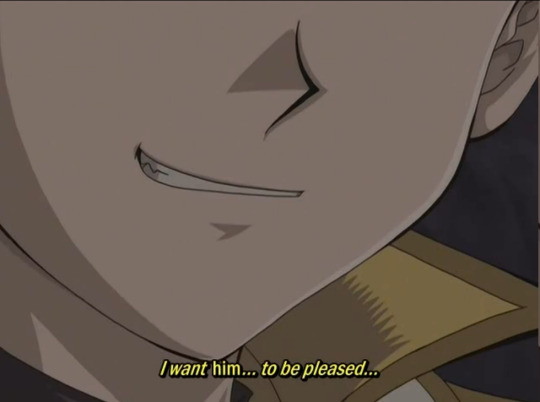
Amon dedicated himself to the Garam conglomerate with Echo by his side before being replaced by his younger brother Sid, the sole blood Garam sibling. He nearly murdered Sid before changing his mind and dedicating himself wholly to his brother instead, a decision Echo and Yubel both describe as willingly chaining himself to their service. Even when given an opportunity to become the heir (all it'd take is watching his brother die to illness, not even murder) he rejects it, and begs for a way to save him.

And yet, when when given the opportunity he made a deal with the devil to break the chains he put on himself and abandon that same family. Then when he gets the chance to obtain power by sacrificing someone he loves, he does exactly that. Then he plans to become king of a utopia free of suffering, and always remember Echo.
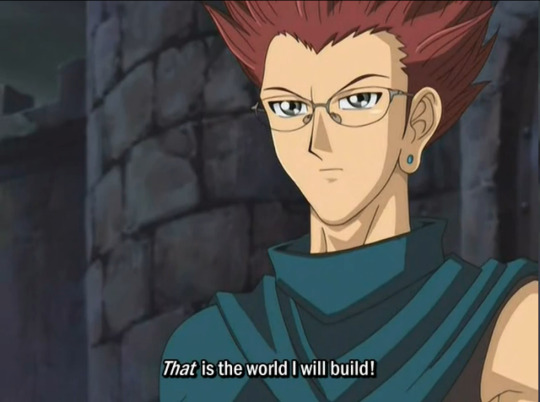
So then, what are Amon's motives? Is he somebody who got tired of being abandoned or unappreciated? An ends-justify-the-means idealist? Just a power-hungry hypocrite? It's hard to tease out a consistent character and ideology from him. And in a show where people wear their hearts in their decks, I think this part of why people hate him - and so does Yubel.
Yubel hates Johan because he's terrifyingly like Yubel in some ways, focused and protective and dear to Judai.** Yubel hates Amon because he can't be like Yubel at all, resenting the brother he dedicated himself to and sacrificing the person he loved for power in an empty world forever devoid of that same person.

No way Yubel can be that kind of person, right? Otherwise, what was it all for?
* To be fair, you don't know all of Yubel's backstory by the time of their final duel with Amon. However, even removing the context of their past life that duel together with Yubel!Johan vs. Hell Kaiser establishes Yubel's central motivations more coherently than they do Amon's.
** Help, I know there's been other essay segments on this topic, text and video alike. But I saw a lot of them back in early 2023 when I was mindlessly going through GX material in a haze of hyperfixation and now I've forgotten all the other good sources.
Yubel and Echo
If Yubel's parallels with Amon are about their dedication, Yubel's parallels with Echo are about who they're dedicated to. Both believe in their loved one's destiny to become a king, and take actions to make them that king.
Yubel has historical basis in that Judai is quite literally the Supreme King, bearer of the gentle darkness. To help him achieve that role, Yubel enacts a plot to break Judai until he awakens his Supreme King side. It fits neatly into their schema of things: this is how they make the person they love stronger, so that they will thrive and survive. Make Judai stronger and awaken his old power, and all will be as it was meant to be.
Echo just believes that Amon is amazing enough that he would make a better king than anyone. When the chances arises to help break his chains and give him a world to rule, Echo takes it.
...And boy does she.

Both Yubel and Echo believe their loved ones are meant to be a king. Both give their lives in support of their loved one, and become weapons wielded in their service.
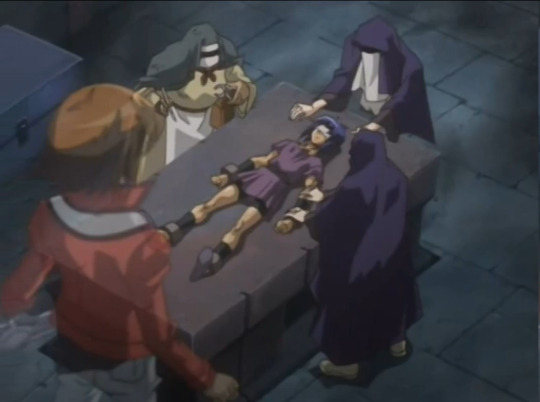
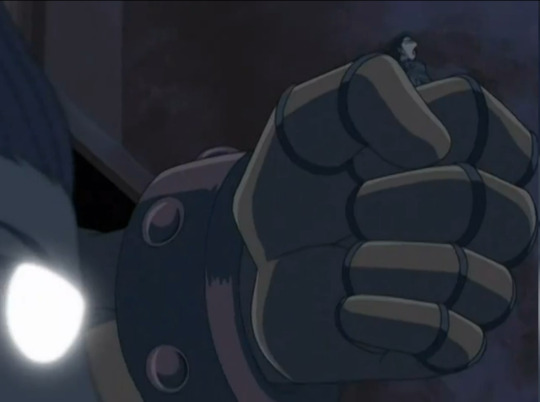
No wonder Yubel was shaken by Echo's devotion remaining within Exodia for just a moment - it's not all that far from their own.

Unfortunately Yubel's only direct interaction with Echo is goading her attack on field-Yubel during the final Amon duel. Otherwise they only speak of Echo as someone used and abandoned by Amon - which in itself has potential, given Yubel's own feelings about Judai sending them away.
I think GX could definitely have explored this connection a bit more. There's space to fill here.
Judai and Amon
As noted above, Judai and Amon both have roles as kings - at least, in the eyes of their single most loyal people. Judai holds the title of Supreme King as the wielder of gentle darkness, and while not confirmed his past life sure looked like a prince. Amon simply has ambition, talent, and an ideal world in his mind.
And in operating with the ambition of kings, they both do terrible things to achieve power. Judai lays this out explicitly in the Edo vs. Amon duel:
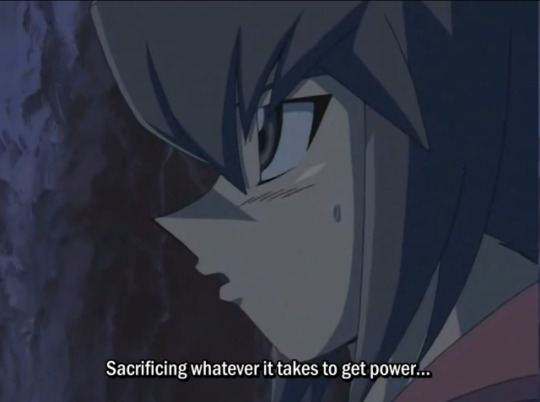

Amon lets his need for power get in the way of his other relationships and priorities, and sacrifices the ones he loves to obtain Exodia similarly to how Judai sacrificed his friends and eventually uncountable innocents for his own goals - finding Johan, and then ruling as Supreme King. Straightforward, right?
But I think there's another parallel between the two that's a lot more interesting. Or...most of a parallel. Namely, their relationship with their other halves and the responsibility of a loyal follower who would give up anything for you, be it their life or their humanity.
What do you do when the person you love most dedicates their existence to you - to the point of throwing everything else away, even their very life?
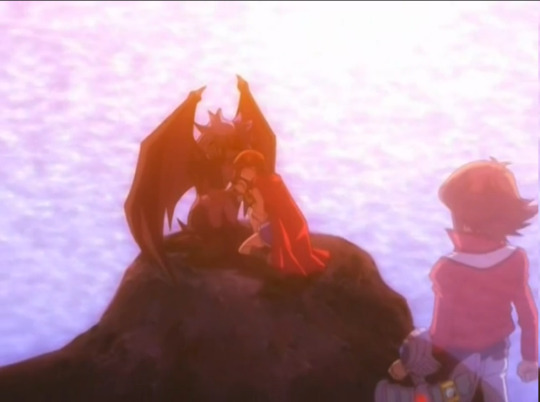
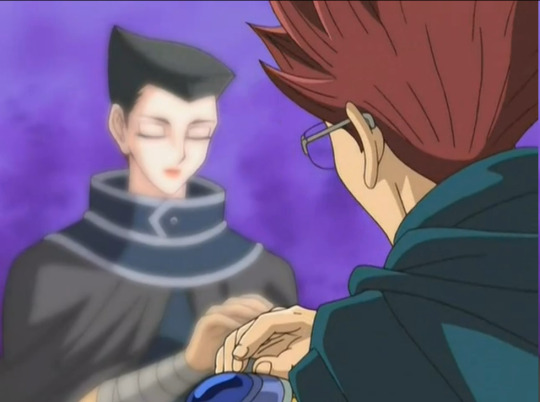
Of course, the Judai-Yubel and Amon-Echo situations aren't exactly the same even putting aside the issue of reincarnation. (For the purposes of this essay I'm not making huge distinctions between Judai and his past life, but if you want to get into the details I've written about that previously.)
Yubel went ahead and made their sacrifice without Judai's input, and all he could do was decide how to respond. He chose to dedicate himself back to them so hard it crossed lifetimes, so hard he chose to risk his own existence for them as well in his next life.
Amon, on the other hand, is the one who proposed Echo sacrifice herself for him. Echo agreed to it, and even by the end she stood by her decision. But Amon loaded the gun and pulled the trigger.

He tries to honor her sacrifice, of course. He's always mindful of Echo's sacrifice and what it means. But in the end, he did choose to sacrifice her, ultimately using her as a pawn. Their love never trumped his own objectives.

And I think the example of Amon and Echo leads to the question: if Judai had the choice of letting Yubel become a dragon or stopping them, what would he do? When it was explicitly their will?
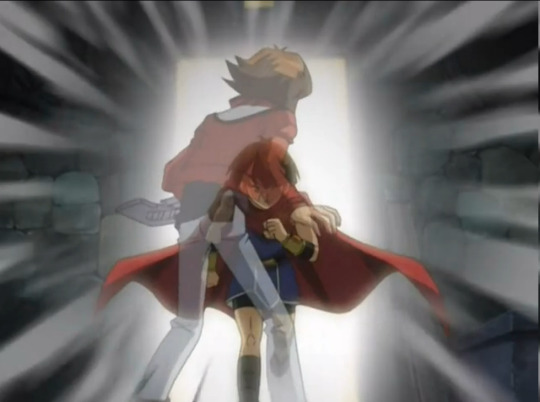
This is another missed opportunity, one that could have solidified the parallels neatly. But GX never asks that question, so the answer is unclear. What could have been a parallel is just kind of...askew.
Judai and Echo
Okay, I admit there isn't a lot here off the top of my head. Probably the best parallels between them are in relation to their other halves, as the people "harmed" by their villainous partners, and how they respond to that harm.
Judai rejects Yubel's torments as unwanted attention, until he remembers the past and flips to understanding why Yubel did they did and makes moves to unite the two of them forever. Echo, meanwhile, understands Amon's motives from start to end and...lets herself be sacrificed, the end.
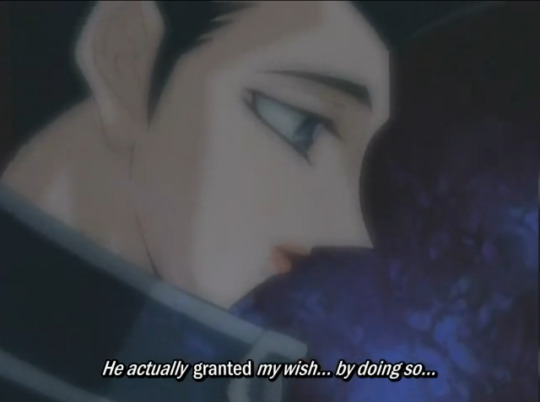
I don't know about this one. Really, ultimately Echo is supposed to be a willing participant in her own sacrifice but in the end I still don't feel like the narrative gave her a strong sense of agency in the matter and it really weakens my attempt to write this section.
In Conclusion
Some of these connections are stronger than others for sure, but I argue that they're all there in some way or another. They're very uneven and overall I'm not entirely sure what you're meant to take from the parallels, and I wish I could give something neat and concise for this section. Instead, it's a bit messy and misshapen - hence, the trapezoid metaphor.
Still, I think there's interesting room for thought in this awkward space. I was certainly thinking about these parallels while working on the latest chapter of Need (accidental last-minute plug?) and trying to figure out exactly what the prince felt while Yubel was in the middle of dragon surgery. What must it be like, to be in these relationships of sacrificial devotion?
#yugioh gx#yugioh series#judai yuki#yubel#amon garam#echo#essaying#meta#analysis#once again thanks to kaiowut99/GymLeaderLance99 for the subs#they're being used for a good cause?#anyway here's the product of me thinking too much about yu gi oh gx season 3#and all things yubel related#i am so on my bullshit
59 notes
·
View notes
Text
everytime jigsaw falling into place comes onto my shuffle I immediately picture the tma finale and just Jon and Martin holding each other in their final moments as everything crumbles around them and EVERY TIME I AM IN FUCKING SHAMBLES MORE RHAN I WAS BEFORE OH MY GOD EVERY FUCKING TIME
#j-mart and Claudeline are like the only couples that elicit such a vivid response to this shit#fuck it I’m writing bullshit essay on this#LIKE OH MY GOD#SCREAMING INTO THE FUCKING VOID#RHEY DESERVED IT ALL#IDC IF THEY MIGHTVE BEEN BAD PEOPLE#tma spoilers#tma#tma podcast#the magnus archives
20 notes
·
View notes
Text
every time I’m forced to see this image bc I have to describe what’s wrong w it to dumb ass ppl a small part of me dies
cw: ugly ass emo whitewashed genshin man

#ppl pointedly ignoring the part where I talk abt how he’s whitewashed#look idgaf if they wanna give n*tlan a more modern vibe but this doesn’t make any fucking sense#how are you gonna take inspo form a nigerian god then make him look like this 💀💀💀#somebody said in response to me calling him ugly asf and whitewashed ‘erm but isn’t he a vampire’ SHUT UP SHUT UP SHUT UP#bro speedran becoming the ugliest character#I genuinely have no words#well actually I do#could probably write an essay on everything that bothers me abt this game#the worst part is probably that it has so many likable elements abd interesting shit and then at the same time being vile#like how do I explain that the g*nshin lore truly is fascinating but the ability to take it serious and enjoy it plummet when you see the#other shit. frustrating asf#also the fact that only h*yoverse games seem to stay relevant and therefor get to have basically endless content is js 💀💀💀💀#but also having some of the most frustrating fandoms and annoying ass people in said fandoms#like the rampant casual racism everywhere#sorry this turned into a whole ass essay 😭😭#I’m js sad n angry that the thing I used to love turns out to be bigger shit than when I left it#like wow#usually I can enjoy revisiting old fandoms n stuff but this is gen ass#bullshitting
21 notes
·
View notes
Note
Which Greek mythology character would you like to see talked about more?
OHoho. you all already know this.
It's Penelope.
And I am being so fucking serious about it. I'm also sleepy and angry and mother nature is stabbing my gut so I'm putting a lot of my emotions into this ask.
BUT her fangirling, angry, bitchy rant of mine, I will save for the end. (and I'll explain it more down there) Not gonna lie, I will probably be mean. Don't take it too personally. (Some folks I know genuinely love her and have stuff for her. Y'all are fine :D )
I have many other characters I wish would be seen more, but hers rant is ooooh. it's been boiling angrily for a long time and this is the perfect ask to let loose.
Take note: This is more about characters who I feel are either underrated and/or not really given love. It's a whole other can of worms about characters who ARE given a lot of attention but are either fandomized to the point of being unrecognizable or people just...really see them wrong.
Ariadne:
A young princess who helped out Theseus to end the cycle of violence against the youth of Athens. Despite the fact that she was going against her family by helping Theseus she did. When he left her, for whatever reason, she was rescued by Dionysus. In which these two have a loving and healthy marriage. There is so much potential here and it makes me sad that she gets butchered and/or just ignored.
Danae:
She was locked up by her father because of a prophecy that happened anyway. She is now pregnant with Zeus' child. She is then locked into a chest in which she is sent floating in the sea. She washes up on Seriphos. Her son is sent on an impossible quest in order to keep her from a forced marriage. Her story is inspiring and ugh sdkf j badass mama! ;~;
Telemachus:
Got that right here :)
Sthenelus:
Fucking love this lil hotheaded cheerleader man. Go boy, go! He got yeeted by Athena from the chariot. Diomedes and him tell each other that they love each other. Tells off Agamemnon for mocking Diomedes' and his dad. He was a child soldier alongside Diomedes. I love this weird lil guy.
Hephaestus:
It makes me sad how people only see him as the "cuck" of Aphrodite and Ares. (no hate to them. do not hate either of them) He's badass in his own right! He does that bigass fire in the Iliad! And one of my favorite scenes in that epic, is him welcoming Thetis! I think he's neat :D
Hebe:
Ganymede isn't the only cupbearer on Olympus you know.
Menelaus:
I love me a goofy wifeman...But if that's all you see him as, I'm sad. What about the sealy man? (aka him wrestling a god for a while and making him tell him answers) The exiled prince? The younger brother? The angry charioteer who yelled at Antilochus? The man who interfered with his brother's letter to his wife to warn to not bring their daughter? Being the sweet uncle figure for Telemachus? (he and Penelope get a lot of the same treatment in a way. with the whole "just the spouse" ;~; )
Psyche:
I think she's pretty popular, but shout out to her anyway :D Because I love her story a lot.
And last but absolutely not least,
Penelope
Heads up once more, but I'm going to be so fucking mean right now. I'm very tired and runnin on 4 hours of sleep and my tummy hurts. This is all over the place and I'm sad.
I think some of you treat the fact that Odysseus is (rightfully) obsessed with her and adores her as if that's HER personality trait... as while it's adorable to see him simping over her as he does, she's not just there for him (and me) to simp for. In the same vein, I think some of y'all only see her for her love of Odysseus and nothing more. Some folks don't see her as anything more than what she is for Odysseus.
AS IF HER HUSBAND ISN'T JUST AS INTERTWINED WITH HER AS SHE IS WITH HIM!
And yet, there is so much stuff with him about the other people in his life. The other Achaeans, Polites and Eurylochus, Athena, etc. You know Penelope has people in her life other than her husband and her son, right?
Even stuff that's just her, it's usually her weaving the shroud...That still ties back to Odysseus. If you wanna have her weave, maybe have her weave something happily. Maybe her chatting with Anticlea or Athena while she does! Or Helen! or her sister!
There's the saying of "the characters respect women but the author does not" and I'm noticing that a LOT in this fandom. I don't think it's intentional, but it's very telling with what people prioritize in their creations how they feel. (and no, I'm not talking about Homer. He wrote incredible women.)
I'm not saying you're not allowed to have favorites. But even if Odysseus IS your favorite, if you have Penelope so one note or with such weak characterization while having so much for Odysseus, FOR THE MEN WHO HE IS NEAR... It's just really telling.
I've even seen some shit with "Well, there's not much to do with her." as if y'all don't make OCs with less. I've seen people give Astyanax, an AU baby, more characterization than her. (Have him alive in your AUs but if you give him more character than Peenlope, I am side-eying you so hard.)
It genuinely pisses me off how overlooked she is. I hate how her tags are basically empty (honestly? I might start tagging my silliness for her correctly because it has so lil.)

Hey, why do followers of the other tags show up but not for #penelope of ithaca? It's clearly because she has SO many followers/fans that she broke tumblr! Especially with the fact that you can scroll all the way to the bottom pretty quickly! /sarcasm
(btw, before you say something, I know there's no consistent tag for Penelope. I follow many of them. #penelope odyssey is kind of the best bet I believe. #penelope of sparta is mostly about that new show that's coming out and hyping about it. still not about HER. #penelope mostly has some bridgerton character. so yeah. Not much on tumblr)
(shoutout to the artists who got their art on front of the tag! That's exciting! I'm being a mean bitch right now but that's fun and exciting!)
I hate how people see her as so one-note. I hate how she's often just "Odysseus' wife". MOST CONTENT OF HER IS HIM SIMPING OVER HER. (that's something I'm guilty of too! I plan to fix that soon. I have so many wips and so lil time and too high of personal standards because since she has so little content of her, I WILL make it good. I'll TRY to make it good.)
EVEN HEADCANONS! SO MUCH OF FANDOM STILL ONLY HAS HEADCANONS THAT HAVE TO DO WITH ODYSSEUS OR TELEMACHUS. GIVE ME SOMETHING ABOUT HER CHILDHOOD. GIVE ME LIL QUIRKS SHE HAS. What does she struggle with? What's her favorite color? Does she like dancing? ANYTHING.
Feelings about how fandom sees her are also summed up by this and this. (Edit: This one too. She's not even dead in the Odyssey but people act like she doesn't exist until Odysseus is there.)


...Do you see my problem? Just one of my problems?
So many people genuinely read the Odyssey and just see her as the "crying wife". People diminish her character and her intelligence all the fucking time. You wanna know something I've noticed? PEOPLE ONLY TALK ABOUT HER INTELLIGENCE WHEN ODYSSEUS IS THERE. Like with how she tricks him and how she tricks the suitors. Nobody talks about the moment when Athena appears as her sister in her dream and she is immediately like "hey, if you're some god, is my husband still alive?" she clocks her as Athena RIGHT AWAY.
People constantly forget her violent thoughts against the suitors! Or when she sasses Telemachus and Euryclea. When she scolds and threatens the maids. (she's not always nice y'all!) Do you really think Odysseus would be obsessed with someone who isn't on his level?
We all know that he loves her. BUT WHY?! "Because she's smart like him." Yeah, we know. WHAT ELSE?
They are Likeminded! Thinking and acting alike! You know how fun that is?!
Homer, you absolute mad lad genius. You made her a mystery to the narrator, Odysseus, and for some reason, people see that as her just being a straight up mystery. You wrote her so wonderfully and so complex with how she is so sneaky in her own way that people are literally tricked by her as readers as well!
Or sadly, more likely, people fucking blackout when she's in the scene and there's no Odysseus. 🙄
Look, even if you have Penelope be the "braincell" who keeps her husband in line, MAKE SURE SHE'S NOT ACTING LIKE ODYSSEUS' FUCKING MOM. They're both grown ass adults for fuck's sake!
Also...please...PLEASE have her be more than a prop for the men around her. I've read some things that could literally have her be replaced by Euryclea, as Penelope is sometimes just used as a sounding board.
I'll be even more bitchier. Even in the OT3 she's commonly in. It wasn't a NOTP until I noticed most creations of that ship was just "Odysseus and this person for 6000+ words... Oh, and Penelope making an appearance in the footnotes." If it's an OT3, they all love each other right? Where's the PenDio fics/art, cowards?
I have a weird theory about how people treat her that way. (other than fandom prioritizing men)
So there's "girlbossing" and "uwu sad victim" that fandom can never seem to leave. I think People do this with Helen and Clytemnestra and that's why THEY are "blorbo-able". (not saying they shouldn't be but they definitely get more love than Penelope)
Helen, despite not always being a victim in her story, has been through so much. Kidnapped and some people blame her for it (irl and some people in canon do blame the war on her). Very easy to cling to. I cling to her too! (she's on the "UwU always victim. tragic blorbo" end)
Clytemnestra, is a victim in the sense that she's a grieving and angry mother and wife. And so she killed Agamemnon. Her violence and anger is seen as "girlboss" despite all the horrible stuff she also did to her children. (she's more on the "girlboss" end)
Penelope, is not a victim to the same degree as Helen nor does she murder anyone (how could she? it was 108 people against her and the Odyssey shows that the suitors' parents were enraged. Even Odysseus was skeptical he could beat them.)
She's not on either end of the "scales" for people to find her "blorbo-able". She doesn't murder her husband or the suitors by herself or is a victim to them in the same way Helen is.
And that's just for people who know her husband didn't cheat. I think with people who think Odysseus did cheat, they hate her because "she let it slide". That she's "weakwilled" for knowing her husband went through literal hell and wanting him to be happy and safe.
Idk, It's a little lonely being one of the few "Penelope crazy" blogs.
I sometimes wonder if people kind of come to my blog in a "Hey, can you love her for me? Can you think about her for us?" as I have seen very little on her childhood for example. It's STILL mostly in relation to others.
It's not even the "sharing ideas" that bugs me. it's the feeling of people not wanting to come up with headcanons/ideas for her OUTSIDE of canon.
"She was in Helen's shadow." Okay, well, how did she feel about it? What did she do about it? Did she hide away? Did she internalize that? Did she find that freeing? To not be the center of attention?
Stuff like that. Dive DEEPER. PLEASE
It makes me happy that people love my Penelope as I love her too, clearly. But I really fucking hope you love the CANON Penelope too. If you think I made Penelope "better" or anything like that, then leave. She's already fantastic on her own.
I want to talk about her more. I want her to be seen more.
#lol so pathetic that I'm all weepy about this right now. fucking hormones and cramps and bullshit#I'm allowed a few mean sad rants right?#I'll probably regret this later. as I know I'm swatting a hornet's nest#this is like. a fandom in general rant. like people do this to other female characters too#I almost want the Penelope part to be it's own post? because I think it's important. at least to possibly make people just...SEE her.#i dont know#penelope of ithaca#Mad rambles#shot by odysseus#my headcanons#ask#anon#penelope#Water Wife#<-I love my Water Wife but I sometimes regret it. As I think some people actually think it's the only way she can be interesting.#when she's interesting without it. at least y'all SHOULD be thinking of her like that.#penelope of sparta#Mad rants#essay#odyssey
41 notes
·
View notes
Text
I love trying to explain to people outside my main fandom what my most controversial fandom takes are because most of them are either canon or so-heavily-implied-as-to-be-canon, but somehow it's still a huge issue to talk about them.
#fandom bullshit#fandom vent#legit I will write a damn essay#with cited sources#and like#scientific research#and basic fucking math#proving that something is canon#and that the people asserting otherwise#were either misled by insidious fanon#or are just rejecting the lore#and I still get people going#'well ACSHUALLY—'#bruh#I'm literally giving you a fucking timestamp#to where it is stated outright#multiple times#over multiple entries in the series#and nah#that's too hot a take and I should kill myself for saying it
24 notes
·
View notes